#I’m terrified to know whether they’re going to do an original story or adapt one of the games
Explore tagged Tumblr posts
Text
Btw yes I saw the live action zelda news and yes I am pretending I didn’t
#maze runner director….?#look the books weren’t good so maybe he didn’t have much to work with#I’m terrified to know whether they’re going to do an original story or adapt one of the games#I’m hoping it’s an original story so they don’t tarnish the image of one of my favorites#probably original so they can give link more characters to interact with on his quest#like sidekicks that aren’t just navi or fi#zelda probably won’t be a damsel in distress either considering how they portrayed peach in Mario movie#if it IS based off a game I feel they’d want to go for breath of the wild just based off popularity/recency#I think that will make for an abysmal movie though#which leaves idk. either skyward sword or ocarina of time probably?#skyward sword probably the most cinematic and you can play up zelink romance#and link would feel connected to zelda as they knew each other for a long time#ocarina of time I don’t think the time travel gimmick would adapt well#p
4 notes
·
View notes
Note
do you think kazuki will beat himself up over rei irreversibly damaging his own arm? rei did do so for their sake after all...
Hi! So I’m going to have to start by apologising – originally, I was hoping to scoop up some screencaps to underline my thoughts, but it’s a bit late over here so I’ll just go on memory, lol
Long story short: If Kazuki does experience any guilt over Rei’s arm, he internalises that feeling and keeps it very much to himself. For me, I think it’s more likely that Kazuki just accepts that it was something that Rei felt that he had to do – and, as such, Kazuki supports him 100%.
Long story long: I’ve mentioned before that one of the really special things about Rei and Kazuki’s bond is the sheer level of trust they have in one another, even though they don’t always verbally communicate their hardships. Kazuki and Rei are two men who, when they devote themselves to a decision, do so with almost terrifying conviction.
With the exception of Episodes 10 and 11, where their world was thrown into disarray because of Misaki, Kyuu-chan and Ogino, Kazuki and Rei, after committing their lives to looking after Miri in Episode 3, never question their choice. Instead, they both accept their new dynamic as the new status quo and neither of them ever begrudge it (I mean, Kazuki ‘vents’ to Kyuu-chan in Episode 7 about having to do all the housework and there’s some tension in Episode 5 where they try to balance being papas with working, but on the whole, there’s never any ill will about the fact that they’re caring for a tiny person). We can see, therefore, that Kazuki and Rei are both pretty flexible – Kazuki a bit more so than Rei, but if we consider that Rei, who was ‘like a robot’, signalled that he was Miri’s papa within a month of meeting her, we can appreciate that he’s pretty dang adaptable, too.
That trust is communicated in other ways, too. Kazuki’s the one who collects their payments from Kyuu-chan (Episode 1). Kazuki’s the one who keeps an eye on the household finances (Episode 5). That alone speaks volumes. They’re living under Rei’s roof. In Episode 2, when Kyuu-chan asks whether they’re ready to take on a new job, all Kazuki and Rei have to do is briefly nod at one another to know that they’re on the same page.
But here’s the key point: when Kazuki or Rei makes a decision, the other doesn’t question it. For instance, in Episode 3, when the family embark on a quest to return Miri from whence she came, Rei asks Kazuki whether he’s sure, but he doesn’t argue the point (admittedly, this was pre-Papa Rei). In Episode 11, when Rei says that he’s going back to the Suwa mansion, Kazuki is momentarily surprised, but expresses his understanding – and then goes off to vent to Kyuu-chan. Once again, we can see that the pair are forceful with stupid things – such as when Kazuki drags Rei to the daycare interviews in Episode 4, or hauls Rei around the zoo in Episode 6 – but when it comes to big decisions, they respect one another’s autonomy.
The way they respect each other’s boundaries is so, so important. Rei was raised to have zero autonomy and yes, Kazuki takes liberties, but he doesn’t infringe on Rei’s lifestyle or try to force him to change. Similarly, Kazuki’s lack of control over a situation led to the biggest losses in his life – it’s understandable, therefore, that he goes to extreme lengths to try and control what’s going on (as Rei notes in Episode 8, Kazuki’s ‘overprotective’).
How does this all relate to Rei’s arm?
In Episodes 10 and 11, Rei and Kazuki have their first real disagreements – because they’re literally fighting for their lives, including the life that they’ve built together with Miri. They reach a conclusion quite rapidly; Rei expresses what he wants and Kazuki throws his heart into it, but lays down some ground rules. Having done that, having sworn to Kyuu-chan that they’ll move forward properly and be a family, this time with renewed conviction, I think Kazuki and Rei both knew that the other was prepared to do whatever was necessary to secure that future.
Therefore, when Rei staggers out of the Suwa mansion, bloodied but free, and says, “I did it to myself,” Kazuki… gets it in a heartbeat. He understands. He appreciates that Rei did what he had to do.
And, rather than angst over that and wallow in a fugue, or make Rei question whether the sacrifice was worth it… Kazuki knows any sacrifice is acceptable for protecting the life that the trio have together.
Kazuki, therefore, supports his partner 100%. The same way he always has done. The same way he always will do.
#buddy daddies#kurusu kazuki#suwa rei#asks#this ended up being a whole essay#looking at just some of the reasons why i love kazuki and rei so much#thanks for the ask!
50 notes
·
View notes
Text
I feel like I can’t stress enough how important Spinner is to the ‘My Villain Academia’ arc, and how badly I need BONES to give him the attention and care in portraying him that he deserves. BONES have been pretty faithful to the manga, they’ve followed the story and brought each scene on the page to the screen... Except for some reason not when it comes to the Villains. Maybe it’s because arguably the Villains wasn’t the focal point of the show and they weren’t what most viewers watched the show to see; fine, but that was the case in the beginning and no longer.
Shigaraki Tomura, his exploits, his character, his story *is* the manga: the Heroes and protag react mainly to him and his actions, his past and motivations is one of the main factors that caused the current central conflict, and resolving his character arc is what will probably bring the whole series - to its end or near end. Yeah, imo I argue that everything about him moves the plot along.
Unfortunately(?), I think Horikoshi-sensei realized/decided/planned this a bit too late in his pacing. He said himself during the Stain arc or so that at first, he wasn’t planning on doing villain profiles - he wanted the villains to be scary.
But for the time being, I have no intention of writing about [the villains]. I do the introductions because l personally like those sorts of behind-the-scenes things, and also because I want my readers to feel a connection to the characters. But with villains, I decided I can't have them too likable. They're supposed to be terrifying.
Often it’s what we don’t know/understand/predict/expect (and therefore can’t get a grasp on) that makes things scary/uncomfortable/dislikable. The Villains were strange, seemingly erratic and incomprehensible in their behavior and motivations, malicious without rhyme or reason. Even now, I think a lot of people still think they’re just ‘completely evil crazy psychopaths’.
Anyways, the quote from him is from Volume 7. A whole bunch of volumes later in Vol. 23, he decided nvm: “The story has evolved beyond that point, so I'm ready to start doing villain profiles.” As he said himself, the profiles are to help the readers connect with the characters, make them relatable and likable. That’s what My Villain Academia is all about in the meta sense - to demystify Shigaraki Tomura and his ragtag chaos friends, to give them depth, and to induce interest in their stories, if not sympathy. Hype them up for the rather major roles they play in this ‘final arc’ of the series.
Enter Spinner, the lizard ninja guy.
Besides his unusual looks, Spinner is really, truly nothing special. He’s got a weak quirk, he holds no title of being the strongest or smartest or whatever member of the League, he’s not related by blood or thematically to any major players in the main conflicts, and his ‘tragic’ backstory is completely mundane compared to his allies - he was bullied as a child, and so is fueled by resentment. In the events leading up to the start of the arc, Spinner is the most moral and understandable of the Villains - has a ‘good’ reason for his crimes (eradicate corrupted Heroes), has standards on who he’s willing to fight (questions attacking the police and anyone with a ‘true heroic spirit’), and wants a concrete game plan instead of aimless discord the rest of the League seems alright with.
Once the arc starts, we immediately learn the basics of his character - he’s got a heteromorph quirk that makes his appearance a humanoid gecko and it’s something he was born with that he can’t control, and yet he faces discrimination from literal KKK-type cultists who refuse to see him as human. This was more or less his life in his small, rural hometown, harsh enough that his heart had become ‘completely empty’. It’s simple, it’s relatable and an realistic analogy anyone who has faced prejudice and harassment and been hurt by it can understand.
All this is so Spinner ends up being the most normal and typical sympathetic of the League of Villains, which sets him up to be a sort of ‘gateway Villain’. It’s why he’s narrator. He doesn’t understand at all the crazy All For One shenanigans, he’s thinks Shigaraki is an incompetent weirdo, and he asks what we were all thinking: “Shigaraki Tomura, what the fuck are you doing.” Quite obviously, Spinner’s meant the audience surrogate and so he is. That being a core of the way the story of My Villain Academia is told means it needs be followed by the anime adaption.
This core sets up the rest of the arc - sets up how we will come to view Shigaraki Tomura and his backstory, alongside the rest of the League Villains, their relationships and dynamics with each other, and who they are at heart. Shigaraki’s telling of his distorted origins in Chapter 222 is horrifying as it is already; but it’s Spinner’s worried-facial-expressions reactions littered throughout the chapter that adds to it by telling us one major thing: Spinner’s an empathetic guy, because he immediately feels a kindred spirit with Shigaraki when the latter talks about the hollowness he feels. So begins the audience surrogate’s change of opinion and us readers going along with it, and also: that Shigaraki Tomura now has Spinner’s concern and attention - and is deserving of it.
Pardon the sudden heavily edited quote, but CS Lewis says,
Friendship arises...when two or more of the companions discover that they have in common...which, till that moment, each believed to be his own unique [burden]. The typical expression of opening Friendship would be something like, "What? You too? I thought I was the only one." ...And instantly they stand together in an immense solitude.
That’s almost word for word Spinner in that moment, suddenly realizing he’s no longer as alone as he thought. He’s no longer as alone, and this means perhaps neither should Shigaraki. Because established in that very chapter, too, is the hate in Shigaraki’s heart fueled by his grief and despair, the loss of his family, past, and faith in others, his misery of thinking he’ll never feel good again. Yet - there’s Spinner, willing to extend some empathy and care, the very antidote to all that Shigaraki had revealed. Because the desire for companionship (or at least the lessening of the pain of loneliness) is universal, even among villains - maybe especially among these villains - we probably love to see it. Want to see it.
On that basis - friendship borne out of empathy - Spinner puts his faith his leader, puts his trust and support, and the rest of the arc is us following the tension of whether he was right to do so. Whether Shigaraki would live up to what Spinner expects of him, whether Spinner will side with Shigaraki despite their earlier conflict. Whether they could become friends, or something like that. And once they do, the consequences of this as things spiral more and more out of control, beyond this arc - that Spinner would know Shigaraki well enough to do something crucial at the turn of a battle later, that Spinner would stick by Shigaraki’s side when he’s in danger, that Spinner is loyal enough to Shigaraki to help him as a friend should.
Through Spinner, we come to see Shigaraki, originally incomprehensible and terrifying, as someone beyond a Villain or a leader, but rather someone valued as a person, a friend, a fellow silly gamer nerd. He’s still scary, of course - just less so, with a seed of doubt of his doom that Spinner - and only Spinner, by virtue of his specific narrative and emotional role in this arc - planted in their characters and the story.
It’s because of Spinner that MVA works, by itself, and as a stepping stone towards the rest of the series. So he really needs to be everything he is, was, and more in the anime adaption please BONES oh my god please
#long post#nalslastworkingbraincell#shigaraki tomura#bnha#mha#heroaca#Spinner#Iguchi Shuuichi#my interpretation of course#but like#everything I said is right there in the text and can be convincingly argued for#so I’m right and it’s mandatory that BONES listens to me
401 notes
·
View notes
Text
Author Interview: Jean Hanff Korelitz on Plotting
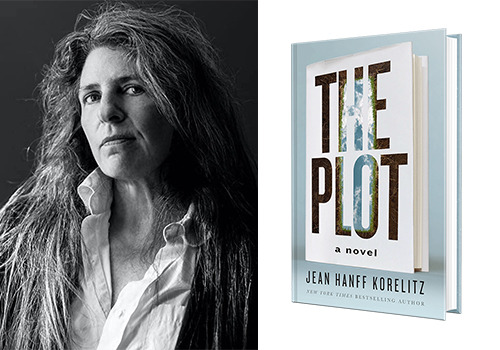
Every year, we’re lucky to have great sponsors for our nonprofit events. In author and NaNoWriMo supporter Jean Hanff Korelitz’s new novel The Plot, a failing author steals an unused idea for a bestselling book with deadly results. Today, we asked Korelitz some questions about how she came up with the idea for The Plot—and her approach to plotting a novel:
Q: How did you go about plotting this novel? For example, did you outline it or refer to any popular plotting resources like Save the Cat or Hero with a Thousand Faces? Or do you trust a more improvisational approach to writing and plotting? Or both?
A: I’ve actually never heard of either of these resources. They sound a bit suspicious, like that computer, EPICAC, in the Kurt Vonnegut story of the same name, who churns out years of ready-made love poems for its lovelorn programmer. It was my favorite Vonnegut story, but I’d still want to steer clear of that input/output when it comes to my own creativity.
For me, a plot usually begins with a “What if” question and finding a way through what happens next comes from thinking it through as it unfolds. What makes sense? What makes too much sense? What is unexpected? Sometimes you get it wrong and have to go back (as I did, once, during the time I was writing The Plot, but that just shows you’re paying attention. Your reader isn’t stupid and doesn’t wish to be patronized (thriller readers in particular are intent on figuring it all out before you’ve made up your mind to reveal the information), and they’ll be the first to tell you how early in the story they solved your big mystery.
I usually know about 60 percent of what I’m going to write before I begin a novel, and my own feeling is that if the author isn’t at least a little bit surprised, herself, as she’s writing the book, it transfers to what’s on the page. That distinctly stale worked-out-in-advance feeling is just what I’m trying to avoid.
Q: Was this novel influenced by the plots of any other novels?
A: No, although elements of the story have certainly appeared in other novels. Plagiarism? John Colapinto’s About the Author, for one. Tapped out professors of creative writing? Michael Chabon’s Wonder Boys. Creative self-doubt? There’s an entire sub-genre of Stephen King’s oeuvre about that. I’m already seeing a bit of “Doesn’t this book sound like…” questioning on Goodreads and Amazon. The specific books and movies that have been mentioned are way off, but you can describe most things in ways that make them sound like most other things. I don’t think these particular questioners have read the novel, but if they do read it they’ll realize that they’re actually demonstrating one of its arguments: most ideas are not original, and should not belong to any one writer.
Q: While writing this book, you must have put yourself in the shoes of your main character. Do you think you’d ever steal a genius idea for a book if you knew it would never be used?
A: I wouldn’t, but only because I’m squeamish by nature and I’d be terrified about that degree of exposure and disapproval. But, like most artists, I also understand that stories run underneath the ground of our collective experience, and we all dip into them, whether we’re aware of it or not.
The real question is: At what point does a collective story become the individual property of a person or an artist? Who’s going to seriously accuse Jane Smiley of “appropriating” Shakespeare when she wrote A Thousand Acres, or Charles Frazier of stealing from Homer when he wrote Cold Mountain? A contender for the 2020 Pulitzer Prize for Drama was The Inheritance by Matthew Lopez, which openly adapts Forster’s Howards End to contemporary New York City. This is a normal, even laudatory practice, which artists fully understand.
But to help yourself to the specific plot of a recently deceased author who never completed his book? I don’t know where the line is, exactly, but I’m pretty sure that’s over it.
Q: Throughout The Plot, several characters posit that writing can’t be taught. As a writer, do you agree or disagree?
A: Let’s just say that I’ve long felt there’s a limit to what can be taught. On the other hand, I have many friends who have benefitted from time in MFA programs and writing seminars, and my husband teaches poetry writing at the college level, I think rather effectively. I didn’t go the MFA route, myself, but I did take a creative writing class in college, and I learned something very important in that classroom, which was that I was allowed to make things up. It seems so obvious, but in my own case, I required someone to explain that to me, and I’m grateful to this day that my teacher did.
Q: What plotting advice would you give a beginning writer?
A: Read bad books (in addition, of course, to great books!) and ask yourself why they’re bad. Then, when it’s time to write your own novel, don’t do those things. Sounds simple, doesn’t it? That’s because it is. I just wish more people would do it.
Jean Hanff Korelitz is the author of the novels YOU SHOULD HAVE KNOWN (adapted for HBO as "The Undoing" by David E. Kelley, and starring Nicole Kidman, Hugh Grant and Donald Sutherland), ADMISSION (adapted as the 2013 film starring Tina Fey), THE DEVIL AND WEBSTER, THE WHITE ROSE, THE SABBATHDAY RIVER and A JURY OF HER PEERS. A new novel, THE PLOT, was published on May 11th 2021. Her company BOOKTHEWRITER hosts "Pop-Up Book Groups" in NYC, where small groups of readers can discuss new books with their authors. www.bookthewriter.com
#nanowrimo#writing#amwriting#plot#camp nanowrimo#writing advice#by nano sponsor#jean hanff korelitz#the plot
45 notes
·
View notes
Text
The Joker Tropes Part 2
Taken From Here and here
Nether Realm Studios especially seems to love making Joker out to be evil incarnate. In Injustice: Gods Among Us and its sequel, he loses all his cred (and life) once he nukes Metropolis; Harley ditches him entirely, Batman just completely gives up on indulging him any more, even Guest Fighters like Hellboy consider him worthless, and non-Batvillains such as Grodd and Brainiac and even Darkseid loathe him for either Metropolis, or just in general principle. Mortal Kombat 11 shows that even the MK cast see him as a scourge upon the realms, and also express distaste toward him for either his nuking, a previous outing, or because he's seen as a buffoon who cannot be taken seriously (this is usually the case for other villain characters).
About the only person who can tolerate him for long is Lex Luthor, only because they both have the same level of hatred for their respective enemies. Even then, Luthor prefers to keep his distance from the Joker, if only because a bored Joker screws with everything For the Evulz.
In the animated series, he claims to have been beaten as a child when interviewed by Harley Quinn. It is unknown if this is true. According to Batman, he's simply making it up.
In one issue of New 52, he claims to have been driven insane by an abusive grandmother, who also bleached his skin to its present pallor.
In the same continuity, he is one to a baby gorilla he adopts, trains up as a gun-wielding henchman, and ultimately gets killed off for laughs.
In the comic book adaptation of Injustice, it's implied Harley fears Joker would be one, and gives their daughter to her sister, lest he kill the child. It's left ambiguous whether the Joker's even aware of the ruse.
Averted in one story, wherein one of Arkham's doctors realizes Joker's faking insanity just to piss off Batman as revenge for his disfigurement. Another doctor finds the report and excitedly reveals it to the current head doctor, only to learn that the Joker left it for everyone to read, since the paper's written by Harley Quinn, and therefore worthless as evidence.
In Batman: The Man Who Laughs, it's established that the name "The Joker" was given to him by the media, and he liked it so much that he decided to call himself that.
The same happens in Joker (2019), where Murray tells the audience to "look at this joker" when talking about Arthur. Arthur took it to heart.
Batman: Arkham Knight takes this even further by revealing that being forgotten is the only thing the Joker truly fears.
Just to demonstrate how much disregard he has for his henchmen, a reoccurring motivation for offing his own lackeys is failing to laugh at one of his jokes. Or laughing too late. Or laughing for too long. Or laughing at the wrong joke. He's... unpredictable.
The Joker loves it when people laugh with him, whether genuine or not, but if someone laughs at him, they're most likely already dead.
Joker loves attention and being above the normals, so never imply that he's not interesting or unique. Terry exploits this flaw in Batman Beyond: Return of the Joker just to drive him to a Villainous Breakdown.
The Batman Who Laughs. Since the character's first appearance in Dark Nights: Metal, the mere mention of him is enough to put The Joker in an uncharacteristically un-jolly mood and is a good way to get on his bad side. In fact, the dislike of this twisted version of his archnemesis is so great, that when Lex Luthor and The Legion of Doom started cooperating with him against Joker's protests, he quit the legion (after non-lethally jokerizing every other member of it) in disgust.
If you're going to hurt Batman, do it right. One of the supplementary stories for Joker War had him beyond furious with Bane - to the point of promising him he'd kill him in a way he would never see coming - for showing so little imagination in killing Alfred in City of Bane without even letting Batman listen to it to torture him. By his reckoning, if you have a great gag to break the Bat, use it to break the Bat - don't blow it by having Robin be the only one to witness it.
Originally Conrad Veidt from The Man Who Laughs.
Later portrayals base themselves on his actors, with Cesar Romero a popular candidate, and after Jack Nicholson came in, artists such as Alex Ross base him on him, such as the actor's distinct widow's peak and slicked back hair.
During Knightfall he and Scarecrow killed several members of a SWAT team, and one of his last actions in Batman: No Man's Land was to kill Commissioner Gordon's second wife, Lt. Sarah Essen.
One of the alternate realities seen in Zero Hour! was one where he killed Commissioner Gordon instead of crippling Barbara.
Part of the reason Gordon takes over the post of Commissioner in both The Dark Knight Trilogy and Batman: Arkham Series is due to the Joker killing Gillian Loeb. Additionally, the first game in the latter series, Asylum, he sees several of Arkham's guards killed by him and his men.
He's holding a dead cop's corpse in his intro in Injustice: Gods Among Us and using it as a puppet. He also talks to the body of one of the Regime enforcers who captured him once he breaks out and heads to Gotham.
Whether he was driven insane or was already insane and became completely bonkers.
Where he is on the spectrum between "wacky prankster" and "utterly depraved and sadistic sociopath and murderer".
Whether he is a senseless, performative terrorist wreaking havoc for kicks or a deceptively cunning and competent criminal mastermind. Or both. Usually both.
He's no Batman, but sometimes he is a proficient hand-to-hand combatant, Knife Nut or marksman, and other times a flimsy wimp who goes down in one punch. In some of the grittier settings, his raw strength, numbness to pain and viciousness are enough to level the playing field with Batman.
Whether he actually loves Harley Quinn varies. In the animated series, (where Harley first appeared) the writers haveoutright said he's a sociopath incapable of loving anyone, and just sees her as a useful mook. Some other works imply he really does love her on some level (although he's usually still an abusive asshole.)
He can either be Faux Affably Evil, Laughably Evil, just a Monster Clown, or some combination of the three.
At least one such incident implied he would be interested in Batman... but only after he was dead. Again this may only have been a tactic to get under Batman's skin or truthful admission. The readers will never know for certain.
His plot in The Killing Joke is to put Jim Gordon through the wringer hard in the hopes of driving him mad. He'll also try to drive Batman over the edge (particularly, drive him to break his "no killing" rule), sometimes by cutting off all of Batsy's human connections.
The Dark Knight reworks it into Driving Gotham To Senseless Violence with wanton acts of destruction or terrorism, just to prove everyone's as bad as him deep down.
Ironically, a 1952 story has the Joker get himself falsely committed to an insane asylum, to question a patient who knew the location of a cache of money. The end of the story has him Laughing Mad due to a prank Batman used to disguise his identity.
He didn't have his signature laugh. This seems to have been a way to "goofy up" the character to make him less terrifying in the days of the Comics Code Authority. Later on, he'd learn to giggle while remaining terrifying.
He actually committed crimes for moneynote , and wasn't really interested in causing chaos or terror for a joke's sake.
Building off of that, his plans weren't really "insane" until the Silver Age (at which point it's not even fair to say this was exclusive to him), nor was there any question of the character's mental stability.
His obsession with Batman wasn't there, much less the idea that he would pass up chances to kill the Bat or learn his identity. This aspect was probably introduced to explain the Bond Villain Stupidity he (and every Batman villain) had become infamous for in the Silver Age.
His clown-like complexion was actually makeup in his early appearances. He even removed his makeup to disguise himself as a cop, which was referenced in The Dark Knight. It's later revealed that the look is permanent after falling in a vat of chemicals.
The Brave and the Bold #111 and #191 have him team up with Batman to clear his name after being framed for several murders. The first instance turned out to simply be a framing the guilty part occasion but the second instance was actually genuine on Joker's part (except the person Joker seemingly murdered turned out to be faking their death).
He also does this with Batman whenever The Batman Who Laughs is involved (specifically in the Dark Knights: Metal series).
He abruptly ends a partnership with Red Skull when his Nazi affiliation comes out. Red Skull simply wonders why he is so surprised when he thinks that the Joker would make a great Nazi. The Joker is NOT happy about this, proclaiming "I may be a criminal lunatic, but I'm an American criminal lunatic!" It even provides the trope's image. And yes, folks, even an equal-opportunity murderer like the Joker despises the Nazis!note
The exception is mentioned again in the Last Laugh arc where the Joker immediately refused to join the American Neo-Nazi Aryan Alliance group in the Slab after he was offered membership. Joker: I'm evil and all that, but you guys are just plain mean.
Will not harm dumb animals and doesn't condone it. There's no humor to be had in that. Higher primates apparently do not qualify but a lot more effort went into that one.
While in Arkham with villain Warren White, AKA the Great White Shark, Joker calls him the worst person he ever met. He states that while he may kill people, even he doesn't steal their kids' college funds.
Sees nothing funny about someone parking in a handicap spot when they're not handicapped. However, he does think it's hilarious to hurt them in ways that will make certain they'll always be able to park there.
A girl named Janey Bennett, whose class was studying criminal behavior, became pen pals with the Joker while he was in Arkham. When Janey revealed that her father, the mayor of Motor City, was abusing her (exactly how isn't specified, though it was implied to have been really bad) the Joker broke out and, convinced that the authorities would be of no help, tried to force the mayor into admitting to his crimes and giving him Janey (so that he could find a better home for her) by threatening to contaminate the city's blood supply, going through with it (because the ends justify the means) when the mayor refused to give in to his demands. He originally intended to give her to Batman as well so he could protect her but at the end decided to give her to her mom. Joker: I mean, stealing a city blind is something I can admire... but being mean to one's own daughter... that just makes my blood boil.
For a rather literal form of "standard", the Joker's team-up with Carnage in Spider-Man and Batman: Disordered Minds fell apart in part because the Joker, known for his love of theatrics, found Kasady's desire to get straight to killing boring. Conversely, Kasady didn't like the Joker's flair for theatrics.
The Joker absolutely loathes The Batman Who Laughs, to the point where he drops his usual joking demeanor and is deathly serious whenever directly referring to him, even willing to work together with Batman to face him when it comes down to it. When Lex Luthor goes behind his back to make a deal with The Batman Who Laughs (going against the only condition Joker has for joining his plan), Joker responds by Joker-gassing the Legion of Doom, putting Lex into a series of deathtraps, trashing Lex's Power Armor, and quitting the Legion. In the process, he tells Luthor how he had planned on ruining the Legion utterly on the verge of victory, and as nightmarish as his plan sounded, he claims it is nothing compared to what the Batman Who Laughs is going to do.
While he still gloated about it and found Commissioner Gordon kneecapping him funny after remember that he'd crippled Barbara, the actual act of killing Sarah Essen in the penultimate issue of Batman: No Man's Land is one of the few times the Joker wasn't happy with something he himself did, considering he's seen walking away while scowling afterward, leaves the babies he originally planned to murder unharmed and immediately turns himself in to the police.
Emperor Joker sees the Joker disgusted with a corrupted Jimmy O Lsen tormenting the Superfamily and Batman when they're turned int animals.
Later one he is disgusted when his minions vandalize the Moai on Eastern Island.
Again, when he rescues Lex from The Batman Who Laugh's infected minions in Hell Arisen, the mere mention of his alternate universe rival prompts him to have a very uncharacteristic Freak Out. The Joker: I told you. I told you not to deal with him. You should have shot that thing in the head the second you had it in a cage! It is wrong. It is a wrong thing.
Played more straight in his relationship with Punchline. Only time will tell if it lasts.
There’s also a comic storyline when Hush informed that a dirty cop Office Halmet killed his wife Jeannie. The Joker wanted nothing more than to kill said cop in revenge. Then there’s Batman: Three Jokers where, despite it being being heavily implied he was abusive, the “Comedian” Joker is seen setting up fake tea parties with dolls, clearly trying to substitute them for his wife and child showing that he does miss them and desire to be a family with them.
While The Dark Knight is one of the few times the Joker's clown-like appearance is the result of make-up, he does sport a Glasgow Grin.
While Joker still has the permanent clown look, it's combined with the Glasgow Grin.
While Batman: Endgame would see the skin of his face restored with a chemical called Dionesiumnote , at the start of The New 52, the Joker had the Dollmaker skin his face and then, after he recovered it, spent Death of the Family wearing it like a Leatherface-esque mask. And even in Endgame, his restored face ends up badly burned as the result of the finale battle between him and Batman, though it still ends up restored again.
Gotham sees neither Valeska escape this. After his death in season 2, Jerome (the proto-Joker) ends up resurrected in season 3, but because Dwight thinks his attempt to revive him failed, Dwight ends up cutting off Jerome's face ala Death of the Family and Jerome ends up stapling it on when he catches up with Dwight and while he later has it properly reattached, there's still scars from what happened. Jeremiah, Jerome's twin and the show's true Joker, ends up with the "perma-clown" appearance due to Jerome having the Scarecrow brew something up to spray in Jeremiah's face, but season 5 sees his fateful fall at Ace Chemicals badly scar his face and sear off most of his hair with only stringy patches left.
Averted entirely in Joker (2019), where his clown appearance is entirely makeup, and the worst it gets is painting his iconic smile on his face with his own blood from a car crash. Not even a Glasgow Grin or anything, the blood is from his hand and his face only has a few normal cuts on it.
While Batman is a rather serious character who refuses to kill anyone, The Joker is a rather comical character who revels in death.
Joker's gadgets tend to be rather goofier but much more lethal, such as the Joker Venom that he often uses to kill his victims.
While Batman gets along well with his sidekicks Robin and Batgirl, Joker frequently abuses his sidekick Harley Quinn and has tried to kill her before, not to mention all the times he has been a Bad Boss by killing his henchmen for any reason you can think of, sometimes for no reason at all.
While Batman's backstory is well known, even by the citizens of Gotham who know of the tragedy of the rich Waynes' in Crime Alley, no one knows anything about the Joker's backstory, but most versions he tells are consistent in two things: he was a nobody, and possibly someone poor.
In most adaptations, his voice is high-pitched in contrast to Batman's Badass Baritone.
Why he went by the name the Red Hood has changed over the years: The Killing Joke claims he was a failed comedian driven to crime to support his pregnant wife. The trauma of his disfigurement from jumping in the acid and his wife's earlier accidental death drove him insane. However, even this backstory is questionable, as the Joker himself calls it "multiple choice".
In Injustice 2, an intro with Atrocitus has the Red Lantern wondering what drove the Joker to nihilism.
In the animated series, he claims to have been abused as a child when interviewed by Harley, but according to Batman, it's just another ruse to escape Arkham.
The purple suit and matching pants with either an orange and/or green shirt with a bowtie or tie, remains the definitive Joker look one that many artists and costume designers have given spin on. He is sometimes known for wearing a cool hat but other times goes hatless. Heath Ledger's custom-designed purple long-coat, trousers, blue shirt and green Waistcoat of Style with a tie has likewise become iconic and famous for its contemporary and downright stylish update on the classic look.
The original Red Hood outfit which is a black suit, white shirt, bowtie with an opera cap and a bizarre red dome is also quite famous.
The Hawaiian tourist outfit he wore in the notorious scene in The Killing Joke.
The white suit he wears in Miller's The Dark Knight Returns as well as the white nurse maid outfit with red wig in The Dark Knight is also quite notable.
The Future Joker look from Batman Beyond: Return of the Joker which went with a mime look (black body suit, slicked-back hair) is also quite distinct and unique.
The first issue of Batman with Joker's debut has him described as having "burning, hate-filled eyes" and the moniker, "the harliquin of hate".
The Man Who Laughs had Bruce dosed with a light version of the Joker Venom and he felt his perspective shift into a paranoid vengeance were he felt everyone deserved to be punished for his parent's death just for existing.
Death of the Family had Batman describe how Joker's irises are always narrow when looking at anyone but Batman and that it is usually an indication of negative feelings toward something with Bruce mentioning that his eye are the eyes of someone who hates everything he sees.
In the Justice League storyline "Rock of Ages", Martian Manhunter has to put in incredible effort to reorganize Joker's mind long enough for him to give up the cataclysmic Philosopher's Stone. The briefly sane Joker immediately says My God, What Have I Done? verbatim as he hands it back, before quickly losing his mind and going back to the laughing madman.
The famous example from the end of The Killing Joke, where Batman tries to convince him to allow Batman to rehabilitate him before their vendetta kills them. Joker considers it for a long, somber moment before quietly reflecting that they're both too far gone.
Batman: Cacophony ends with Joker being pumped full of an inhuman amount of antipsychotic drugs to keep him under control while in recovery from a near-fatal stabbing. Batman takes the opportunity to have a relatively-sane conversation with him, though it's somewhat subverted by Joker still being a homicidal sociopath even while heavily sedated.
He even gives multiple reasons on how he came Back from the Dead in Injustice 2 and will go along with whatever his opponent thinks is true, despite being Dead All Along in story mode and only appearing as a hallucination to his ex-moll.
Batman: The Dark Knight Returns sees him kill David Endochrine and Ruth Weisenheimer, who were clearly based on David Letterman and Dr. Ruth Westheimer.
During Knightfall, once he realizes that Azrael isn't Batman, his plan's gone to hell, and one too many criticisms from Gene Siskel and Roger Ebert stand-ins, he kills the stand-ins.
In one of the issues for the The Batman tie-in comic, The Batman Strikes, he terrorizes a stand-in for Conan O'Brien. This becomes darkly Hilarious in Hindsight as the real O'Brien voiced Endochrine in the animated version of Batman: The Dark Knight Returns. In the series proper, Harley's debut had the two of them terrorize a stand-in for Dr. Phil for the climax.
If you want to know how truly terrifying The Batman Who Laughs is, look no further than the way Joker acts whenever discussing him. He doesn't laugh, he doesn't smile. He becomes calm and serious and simply tells whomever he's talking to that the TBWL is "a wrong thing that shouldn't exist". Someone HAS to be scary if the very thought of him makes Joker act like a calm rational sane person.
In Batman Beyond: Return of the Joker, the clown has a massive Villainous Breakdown when Terry mocks him for his failed attempts to break Batman.
On the rare occasion Joker gets bored and leaves Gotham, expect everyone to think of him as just a silly clown, until the bodies start piling up.
One issue of the Robin Series had him talking about having Abusive Parents, only for a psychiatrist to tell him it's the seventh story he's told now.
Batman lampshades on this to Harley in the animated series, thinking it's another lie to gain sympathy.
The Killing Joke claims he was a failed comedian driven to crime to support his pregnant wife. The trauma of his disfigurement and his wife's earlier accidental death drove him mad. However, even this could be a lie, as he himself calls it "multiple choice".
It's even discussed in Injustice 2, as Atrocitus wonders what drove the Joker to nihilism. Despite only appearing as a hallucination to Harley in story mode, he spews out multiple theories for his Unexplained Recovery and will say Sure, Let's Go with That in non-canon fights. Was he resurrected by someone, or is he from another universe? Did he escape from either the Source Wall or the Phantom Zone, or is he just an apparition?
Shadow of the Bat #38, Tears of a Clown: He celebrates his anniversary of the day he was a still sane, but hapless comedian, and was thrown out of an exclusive Stand-Up Comedy club for an unfunny act the patrons mercilessly heckled. It was the last straw as he agreed to provide to his family by pulling a job for the Red Hood gang. So he kidnaps all the patrons and reenacts his act with control collars that will kill them when they laugh. Oddly enough, the patrons are hardcore Stand-Up Comedy fans, so they can't remember the number of times they've booed someone. However, even this origin story could be a lie.
It's come to be his primary disfigurement over the original skin bleaching.
In Batman Beyond: Return of the Joker, Terry McGinnis exploits this by delivering an epic Boring Insult so the clown will have a Villainous Breakdown.
King Barlowe proved to be a big one in his Thanatos Gambit in the episode "Joker's Millions" of The New Batman Adventures. In a spiteful Video Will, he gives the clown his millions, revealing in his tape that most of it was fake. Expecting the clown to splurge on it, he won't have enough to pay off the IRS, allowing Barlowe to get the "last laugh" after his death, without the Joker coming after him.
Alan Moore's "I go Loony" from The Killing Joke, an in-panel song-and-dance tune that was eventually made into an actual song belted out in Batman: The Killing Joke.
Batman: The Brave and the Bold has "Where's the Fun in That?" from the episode "Emperor Joker".
Batman: Arkham City ended with him covering The Platters' "Only You (and You Alone)", Batman: Arkham Origins had him cover Hank Williams' "Cold, Cold, Heart" and Batman: Arkham Knight had him provide an original composition, "Can't Stop Laughing".
Action Fashionista: This incarnation of the Joker has a wide variety of garish outfits for every occassion — most of them straight from the comics.
Adaptational Attractiveness: Metal teeth, lack of eyebrows, and tattoos aside, he's still being played by the youthful-looking real life Pretty Boy Jared Leto; especially since the last two cinematic Jokers were a creepy middle-aged gangster with a botched face-lift and a filthy, scarred vagrant (even the mentally unwell clown-for-hire doesn't scream Mr. Fanservice one bit). This version looks more like Marilyn Manson.
Adaptational Nice Guy: A very downplayed example. While he's otherwise the same Clown Prince of Crime we all know and love to hate, he appears to genuinely care for Harley, and even throws her out of a falling helicopter to save her life. Almost any other iteration of the Joker would do that to save his own skin or rid himself of her.
Adaptational Skimpiness: This version of the Joker tends to be shirtless a lot more than he has in any other medium. It mostly seems like an opportunity to show off his tattoos.
Adaptation Distillation: Leto's Joker seems to be less of the "evil philosopher" that Heath Ledger portrayed him as in The Dark Knight, and instead seems to be a cross between the garish, larger-than-life Mark Hamill version from the animated series and the Arkham games, and the creepy, deeply twisted Brian Azzarello version. David Ayer had also stated that he looked specifically to the Golden Age Joker for reference, providing reason for many to believe that Leto's Joker is a modern re-imagining of that incarnation.
Advertised Extra: Heavily featured in Suicide Squad promotional materials, barely appears in the film for more than seven minutes. According to Jared Leto, several of the scenes he shot were not included in the theatrical cut.
Ambiguous Disorder: In Suicide Squad, most of the time the Joker seems... not all there compared to Harley. In addition of psychopathic tendencies, the Joker has random bouts of maniacal laughter, confusion, and slurred speech-like patterns. All attributes that stem from punch-drunk syndrome. Considering he has faced Batman one too many times, it makes sense that the Joker's mental stability is finally catching up to him.
However, come Birds of Prey, they broke up, mirroring the comics where they do have an Relationship Revolving Door. It appears to stick, as Harley publicly calls it quits between the two of them.
His tattoos are very reminiscent of the Joker in All Star Batman and Robin.
Ax-Crazy: Like all the incarnations before him, calling him a violent psychopath is one of the biggest understatements you can make.
Bedlam House: Spent some time at Arkham Asylum, where he met Harley. Then he broke free from it with the help of both Harley and his gang.
Chewing the Scenery: An important part of the character is his theatricality.
Cool Car: A bright purple sports car with underglow lights and a "HAHAHA" license plate.
Dented Iron: It's subtle, but the numerous scars on his body and metal replacement teeth in his mouth are clear signs that his frequent run-ins with Batman are taking their toll.
Disney Death: He seemingly dies in the crash of his helicopter... only to come back to free Harley from her high security prison at the end of Suicide Squad.
The Dreaded: In true Joker fashion, everyone is terrified of him.
Establishing Character Moment: One that takes place before he even makes his official debut in the setting - he killed Robin (a minor) and vandalized his outfit to mock Batman over his inability to save him.
Even Evil Has Loved Ones: Insofar as much as the Joker can love anyone, anyway, but he does seem to genuinely care about Harley. Eventually, subverted.
Evil Has a Bad Sense of Humor: He considers the brutal murder of a minor as a joke he played on Batman. When he's torturing Harleen Quinzel, he promises not to shatter her well-kept teeth while flashing his own hideous metal dentures. When Harleen later has him at gunpoint, Joker just says "please don't kill me, I'll be ya friend" in a snarky tone.
Evil Is Hammy: It's not The Joker if he's not Chewing the Scenery. And, sure enough, he does.
Evil Is Petty: The graffiti on Robin's costume seems to imply that Joker murdered him just to prod at Batman. It is confirmed in Suicide Squad that Joker and Harley killed him.
Evil Laugh: It's kind of his thing. One notable example is when he chuckles while surrounded by an arsenal of weapons.
Fake Shemp: Indie rocker Johnny Goth stood in for Jared Leto in Birds of Prey, in the flashback where he and Harley torture and tattoo the big mafia thug Harley later bumps back into.
Foil: To Batman as usual, but with some new additions. After 20 years, Batman became more jaded and cruel, while the Joker somewhat mellowed out and his criminal activity became more professional. Batman didn't settle down until the death of Superman while the Joker grew attached to Harley Quinn.
In Suicide Squad Griggs' smug indifference about his gambling debt immediately becomes pure terror when he realizes the Joker has gotten involved.
He is so feared that even the likes of Black Mask would rather steer clear of him. Harley's enemies only start gunning for her in Birds of Prey when it's become clear that she's no longer with him.
G-Y
The Ghost:
There is an allusion to him in Batman v Superman: Dawn of Justice ("HA HA HA Joke's On You, Batman" painted across the chest of the dead Robin's empty suit in the Batcave), but he doesn't actually appear.
He gets mentioned a lot in Birds of Prey, but he's only seen very briefly in some flashbacks, always from the back (including footage from Suicide Squad). There is a whole Deleted Scene where he and Harley have a domestic dispute. Harley leaves the house through the window and the Joker throws her stuffed beaver out through the window. In the film proper, she's just kicked out of the house, with no shot of Mr. J.
Greater-Scope Villain: His role in Batman v Superman. Despite not actually appearing his murder of Robin by this point has driven Batman down a darker, more vengeful path that goes against Batman's traditional moral code; the one that the Joker is always trying to prove is wrong. Batman's rage towards Superman blinds him to the possibility of Lex Luthor being the real threat long enough for Superman to die fighting Doomsday. In a way the Joker's actions contributed to Batman's failure.
Guttural Growler: This Joker is noticeably more snarly than previous incarnations.
Handshake Refusal: He doesn't like to shake hands, as Monster T finds out.
Hell-Bent for Leather: Wears a purple crocodile skin duster at some point in the film.
Jerk with a Heart of Jerk: Despite being a homicidal sociopath, he seems to truly love his girlfriend Harley Quinn. Then in Birds Of Prey, he coldly and violently breaks up with her.
Joker Immunity: He appears to die when his helicopter is shot down about halfway through Suicide Squad. To absolutely no one's surprise, he shows up alive and well in the final scene. It helps that he's the Trope Namer.
Knife Nut: And by God, does he have enough blades.◊
Lean and Mean: This Joker, while muscular, is quite lean, especially compared to the heavily muscled Batman.
Love Epiphany: Well, "love" is pushing it, but Joker realizes his affections for Harley when she dives in the chemical bath that ultimately turned Joker into what he is. Symbolic in the sense she was agreeing to join him in madness. Further adding to the complexity of the scene; Joker was tying up a loose end, having used Harley to escape from Arkham. He lead her to her demise and intended to leave her for death but at the same moment realized she had entered his world and his madness. Joker never anticipated the amount of utter devotion Harley would have for him, something inside him just couldn't walk away from her, so he jumped in to save her.
Manipulative Bastard: He manipulated Harley into helping him escape Arkham because she fell in love with him. When she served her purpose, he would have had her kill herself jumping into a bath of chemicals to prove her feelings. He instead saves her from this demise because he has a Love Epiphany in the moment.
Monster Clown: Like the previous film versions, Joker is an Ax-Crazy criminal with clownish makeup. Green hair notwithsanding, his white makeup, red lipstick and absence of facial scars make him look closer to a mime than his predecessors.
Noble Demon: In Suicide Squad, his whole motivation is to rescue Harley Quinn. His commitment is so strong he doesn't even waste time with pranks or petty acts of cruelty. Everything he does is for someone else.
Only Known By His Nickname: He's only known as The Joker, or "J" / "Mr. J".
Outlaw Couple: He and Harley Quinn are lovers and partners in crime.
Sadist: Even though there was only a few select scenes of him, one of them is him torturing Harley. It's disturbingly obvious that he is positively gleeful over it. And he doesn't seem to have lost any sleep over murdering Robin, either.
Pet the Dog: David Ayer confirms that while he did push Harley out of the falling helicopter, his intent was in fact to save her life.
Satellite Love Interest: To Harley Quinn in Suicide Squad. His characterization revolves entirely around Harley, not even getting involved with the main plot.
Scary Teeth: Several of his teeth are made of metal. According to David Ayer, Batman punched his teeth out after he killed Robin, leading him to replace them with metal teeth.
Screw This, I'm Outta Here!: Although he has a presence at the start of the film, The Joker appears to have left Gotham City to be controlled by Black Mask in Birds of Prey, with Roman saying that Joker has already skipped town.
The Sociopath: He's chaotic and remorseless, much like his previous versions. Special mention goes to his murder of Robin, which he topped off by spray-painting a cruel taunt for Batman onto the boy's costume.
Tattooed Crook: His torso is covered in jester-themed tattoos. He also has a few on his arms and face.
Villain of Another Story: He mainly appeared in Suicide Squad, but his biggest act of villainy to date — killing Robin — happened some years before Batman v Superman: Dawn of Justice, in which he doesn't appear. The spray-painted message on Robin's empty suit ("Ah ah ah joke's on you Batman!") in the latter film can't be anything else than his doing.
Where Does He Get All Those Wonderful Toys?: Is seen with a rather impressive arsenal of guns and knives. And even says to warden Griggs, at some point, "I can't wait to show you my toys." note Notably, he manages to hijack the gunship which was sent to extract Waller and the squad so he can rescue Harley.
Would Hit a Girl: In the past, the Joker electroshocks and manipulates Dr. Harleen Quinzel into allowing her to fall into a vat of chemicals, in order to become Harley Quinn.
Would Hurt a Child: He killed Batman's sidekick, Robin, while the boy was an underage minor.
You Gotta Have Blue Hair: His hair is bright green.
"Knightmare" Joker
"You won't kill me. I'm your best friend..." Appearances:
Zack Snyder's Justice League
"You need me. You... need me... to help you undo this world you created, by letting her die."
The Joker meets up once more with Batman in the nightmarish alternate future where Darkseid has conquered the Earth and Superman turned evil. But things aren't the same anymore between the two legendary foes.
See also the Knightmare page for more on that setting's characters.
Break Them by Talking: He deliberately tries to agitate Batman by reminding him of how many people have died on his watch.
Cop Killer: He wears a bulletproof vest with at least two dozens police badges on it. Whether these were good cops killed prior to the apocalypse or servants of the oppressive regime of Superman after the apocalypse is not detailed.
Costume Evolution: He has ditched his garish gangster suits for what looks like either a medical gown or a butcher gown, complete with orange gloves and a bulletproof vest with a dozen police badges pinned on it. He got rid of his "Damaged" forehead tattoo, let his hair grow and put red makeup around his mouth, looking closer to more common depictions of the character.
Enemy Mine: He and Batman had the worst kind of enmity imaginable, but the Earth being conquered by Darkseid is enough of a Conflict Killer for them to call a truce and work together to try undoing this mess.
Evil Has a Bad Sense of Humor: He utters the line "We live in a society" while gazing upon the devastated landscape in the trailer. This is clearly a Meme Acknowledgement, and it's quite awkwardly used given the context (is there really any society left in this post-apocalyptic world?). It doesn't appear in the actual film, however. The line was improvised by Leto.
Evil Laugh: Even with the world being in such a sorry state and him still being sane enough to acknowledge how bad the situation is, he'll still let some laughs out, even though they sound more subdued than ever.
Evil Versus Oblivion: Even he sees the necessity of teaming up with Batman to try undoing what Darkseid did to Earth.
Future Badass: He survived the apocalypse brought upon Earth by Darkseid and looks like he's geared for guerilla actions.
My Card: He gives a Joker card to Batman as a symbol of their truce. Shall the Dark Knight want to break that truce, he'd just have to tear that card up. The card could be seen strapped on Batman's assault rifle in Batman v Superman: Dawn of Justice.
Nice Job Breaking It, Hero!: Joker gets a high reminding Batman how costly his mistakes in the past have been.
The Nicknamer: He nicknames Mera "my little fish stick" and Robin "Boy Wonder".
Progressively Prettier: Despite being worse for wear, this Joker is arguably even better looking than his previous appearance, with his over-the-top tattooed gangster image toned down and his androgyny played up. Ironically, this version also more closely resembles the Heath Ledger incarnation.
Thousand-Yard Stare: He has such a stare when looking at the devastated horizon as he starts talking to Batman.
Villain Has a Point: While he’s the one who killed Robin, he gives Batman a minor What the Hell, Hero? for sending “a Boy Wonder to do a man’s job.”
Vocal Evolution: His voice is much softer and higher pitched than it was in Suicide Squad.
8 notes
·
View notes
Text
What The Crown cast look like in real life
Cosmopolitan October 19, 2020
The countdown to the fourth series of Netflix's The Crown is on. While the likes of Olivia Colman and Josh O'Connor are returning as Queen Elizabeth and Prince Charles, the new series (which begins around 1977) also sees the introduction of Margaret Thatcher and Princess Diana. We already know who's taking on the roles (oh hey Gillian Anderson and Emma Corrin), and we've also had our first glimpse at them in action. But what do The Crown cast look like next to their characters on the show?

olivia colman as queen elizabeth in the crown season 4
Despite nailing the third series, Olivia Colman recently opened up to The Mirror about how she worried people wouldn't like her version of the Queen.
"It’s much harder to play people that everyone has a vision of, a picture of, and has ideas about,” she said. “I’ve never joined a show that’s already been up and running and successful, but I was such an enormous fan that I didn’t really think about it.”
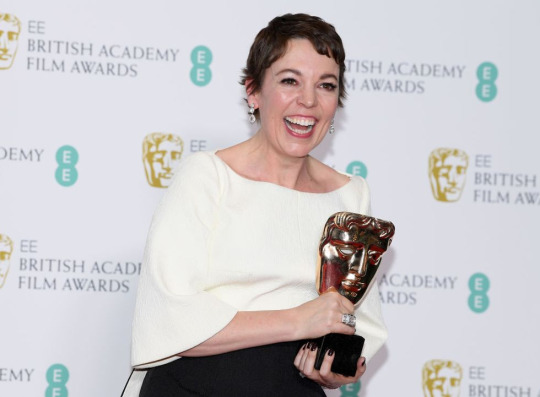
olivia colman in real life
She continued that she was even more anxious that the actual Queen wouldn't like her portrayal, adding, "There is much more pressure when you’re playing someone who is still living, and you have this fear that they’re watching it and won’t like it.”

gillian anderson as margaret thatcher in the crown season 4
Speaking of the role, Gillian said, "I am so excited to be joining the cast and crew of The Crown and to have the opportunity to portray such a complicated and controversial woman."
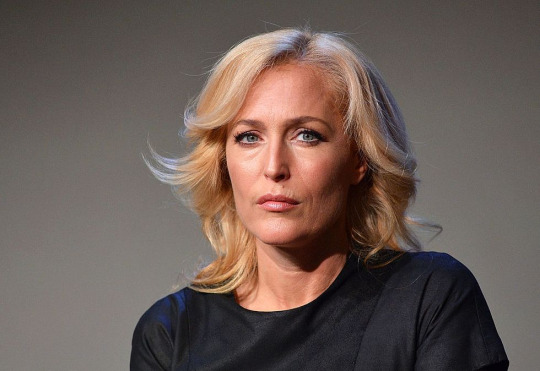
gillian anderson in real life
She continued, "Thatcher was undoubtedly formidable but I am relishing exploring beneath the surface and, dare I say, falling in love with the icon who, whether loved or despised, defined an era."
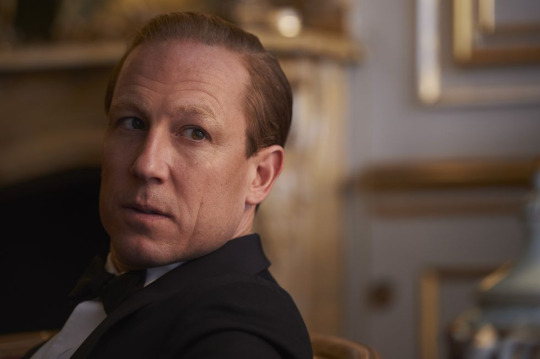
tobias menzies as prince phillip in the crown season 4
When Tobias landed the role for series 3, he said, "I'm thrilled to be joining the new cast of The Crown and to be working with Olivia Colman again. I look forward to becoming her 'liege man of life and limb."
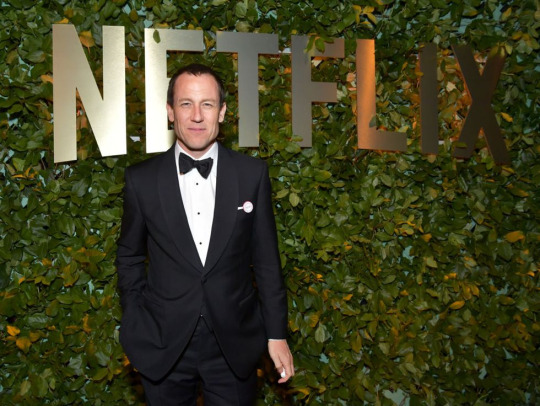
tobias menzies in real life
Speaking of Prince Phillip's personality, Tobias told Vulture interview, "There’s a heat to him. There’s a pent-up energy. A suppression. An alpha maleness that has had to be diverted in different directions."
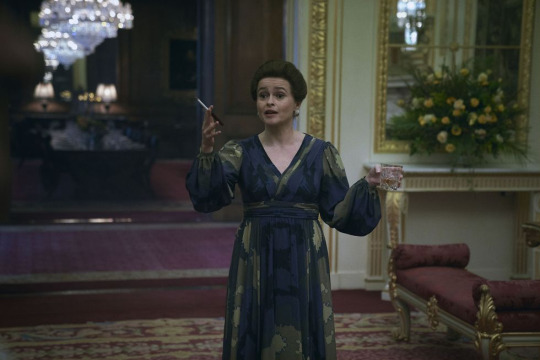
helena bonham-carter at princess margaret in the crown season 4
Speaking at the Cheltenham Literature festival in 2019, Helena revealed she sought Princess Margaret's blessing before taking on the role in The Crown.
"She [Princess Margaret] said, apparently, she was glad it was me. My main thing when you play someone who is real, you kind of want their blessing because you have a responsibility.
"So I asked her: ‘Are you OK with me playing you?’ and she said: ‘You’re better than the other actress’ … that they were thinking of. They will not admit who it was. It was me and somebody else."
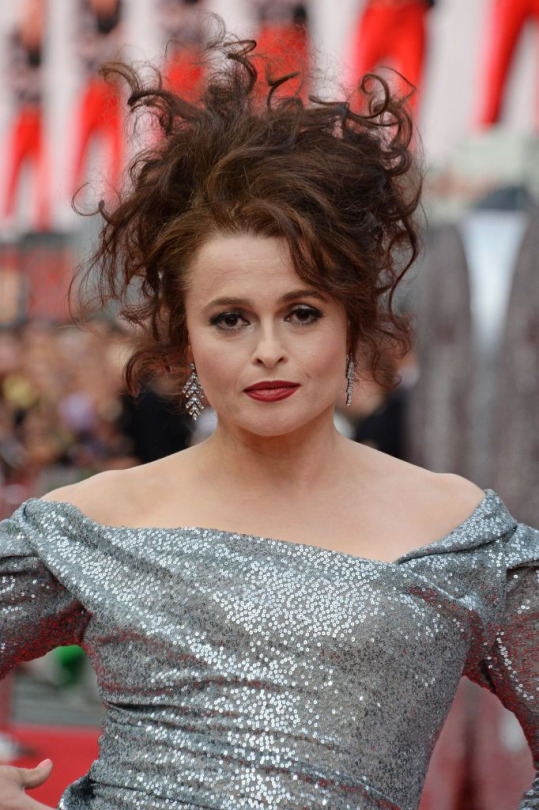
helena bonham-carter in real life
Helena recently revealed a crucial scene from the Netflix original was her idea. She explained how her Princess Margaret character sympathised with Princess Diana, explaining, "She saw Diana being picked up by the press as she was, and she was taken as a fashion template."
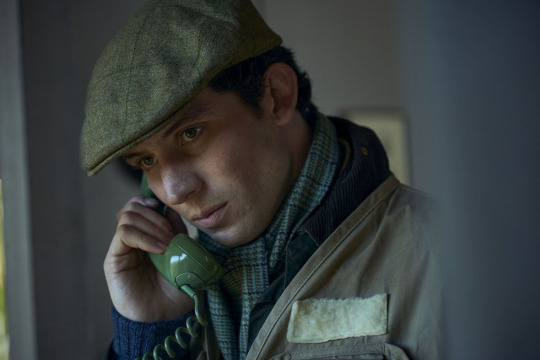
josh o'connor as prince charles in the crown season 4
"Seasons 3 and 4 will follow some of the most turbulent events in the Prince of Wales's life and our national story and I'm excited to be bringing to life the man in the midst of it all," Josh O'Connor said about the role.
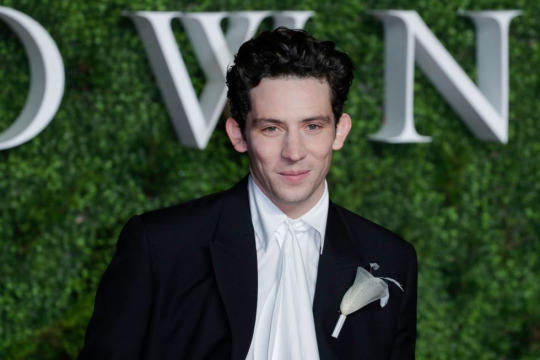
josh o'connor in real life
The actor also told Vulture that Season 4 is "very much the Diana and Charles years, and particularly focusing on what happened there and the ramifications of that going forward."
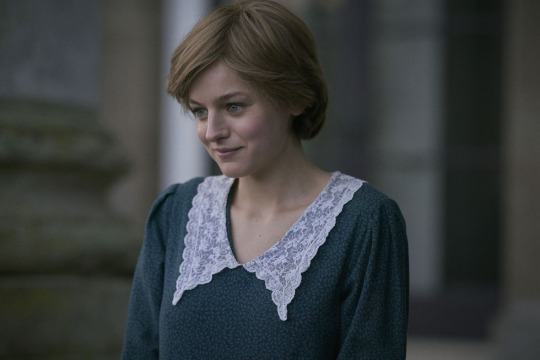
emma corrin as princess diana in the crown season 4
“Beyond excited and honoured to be joining The Crown for its fourth season," Emma said in a statement released by Netflix. "I have been glued to the show since the first episode and to think I’m now joining this incredibly talented acting family is just surreal."
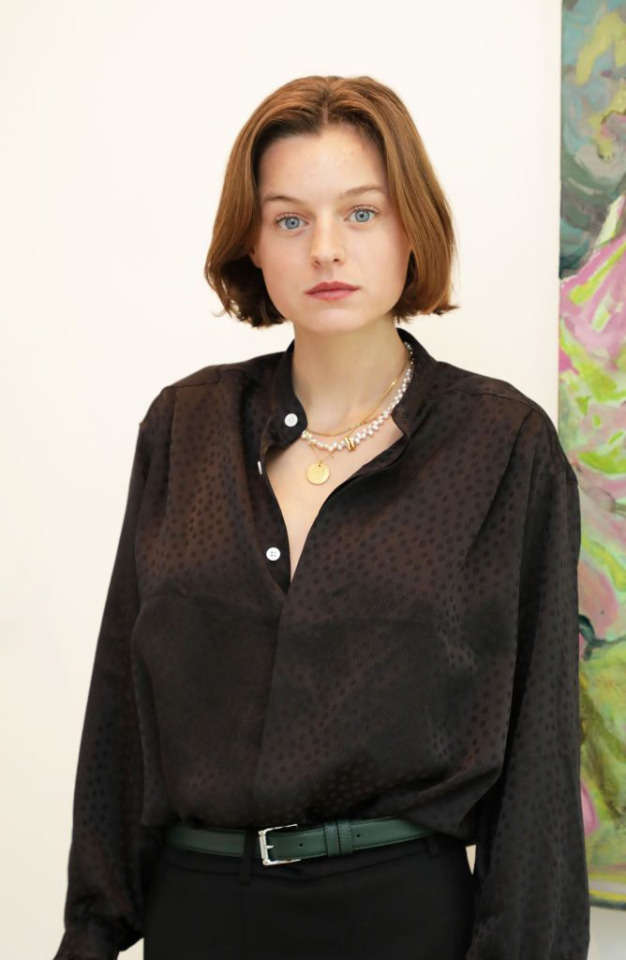
emma corrin in real life
Emma continued, "Princess Diana was an icon, and her effect on the world remains profound and inspiring. To be given the chance to explore her through Peter Morgan’s writing is the most exceptional opportunity, and I will strive to do her justice!”

erin doherty as princess anne in the crown season 4
Speaking of how she adapted for the role, Erin told Town and Country the hardest thing about playing Anne was the voice. “For me, ultimately, it was about the voice because it is so different from mine.
"I had to make sure that was on point. So I walked around speaking as her, trying not to look too crazy. And honestly, the more I did it, naturally it became a subconscious thing.”

erin doherty in real life
“What I love about her is that she is so brutally honest with her feelings,” she told Harper’s Bazaar, saying she would be terrified if Anne didn’t like her portrayal.
“But I genuinely like to think that we’ve done her justice. I feel like a lot of people, like me, will learn so much about her, and fall in love with her as much as I have. I think she’s this incredibly strong, powerful, determined woman, and I really do believe that people are going to be like, ‘Oh, my God, I never knew this about her.’”

emerald fennell as camilla parker-bowles in the crown season 4
Reprising the role of Camilla Parker-Bowles is Emerald Fennell, who briefly appeared in the last instalment. The 33-year-old actress said in a statement about joining the show: "I'm absolutely over-the-moon and completely terrified to be joining so many hugely talented people on The Crown."

emerald fennell in real life
She continued, "I absolutely love Camilla, and am very grateful that my teenage years have well prepared me for playing a chain-smoking serial snogger with a pudding bowl haircut."
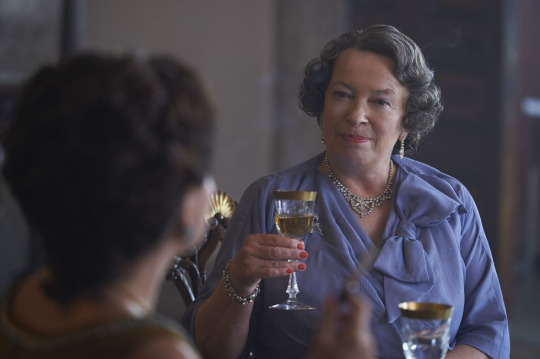
marion bailey as queen elizabeth, the queen mother, in the crown season 4
Speaking about embodying The Queen Mother in the show, Marion explained to Meaww, "The Queen Mother was certainly multi-faceted. She’d had some tragedies in life with the death of brothers during the First World War and of course the relatively early death of her husband. She’d married her husband without any idea that she would one day become Queen, but she certainly stepped up to the plate and got on with a job that she probably never wanted."

marion bailey in real life
The actress continued, "Most challenging for me was finding her physically. I have to say that I was enormously helped by the brilliant costume and make-up teams. The Queen Mother was somewhat better endowed than myself and so a glorious bra was made for me, which I understand is stuffed with lentils and birdseed! Once that’s on, I feel I’ve got her shape. I only need to avoid standing too near a bird table. I’ve also got a great wig and first-rate make up artist."
#olivia colman#gillian anderson#helena bonham carter#the crown#josh o'connor#tobias menzies#erin doherty#emma corrin#emerald fennell#marion bailey#the crown netflix
25 notes
·
View notes
Note
Care to tell us what's swimming around with the Suits AU, like what are the powers that are unique to each suit? Queens vs Kings?
Boy oh boy, I sure would! O///o Any AU I make will always be on an infinite “ask and you shall receive” basis lmao- >///< (Except Church Stop, which I plan on continuing when things settle down) You sent this ask at like a wild time but I finally wrote some stuff for ya so I hope it makes sense. o///o The Sleight of Hand AU is really heavy on worldbuilding so it may take some extra work.
So, here’s vaguely how the suit courts are organized and what each rank kind of entails (I say vaguely, but you know it’s going to be wildly long):
Diamonds - The Regal Suit
The Diamond court is known, or would like to be known, throughout the land as true royalty. They are opulent, noble, and unbelievably full of themselves. Their powers stem from their manipulation of worldly elements, able to craft their own visions of beauty into their surroundings. However they are also skilled in cunning and slightly underhanded methods to get their way. They are determined and headstrong folk who aren’t afraid to get their hands dirty, which may explain why they are in fact the origin of curses in this universe. They are crafty and have keen eyes that are able to very efficiently determine things about someone’s character, and make excellent negotiators.
The common folk of Diamonds are a lot less uppity and posh, but they do have a semi-upper class feel to them. Not because they’re all well off or anything, the land they reside in is just very rich in resources and well maintained in appearance, and it’s within their culture to be on the more refined side of things. They’re skilled in crafting and producing various luxuries, with tailoring being a rather appreciated activity. Art is a huge part of their society, whether it be painting, sculpting, music, even things like landscaping and interior design, etc.
Spades - The Intellect Suit
The Spade court is full of the world’s greatest mages and scholars. They’re always on the search for higher power, and are deathly efficient at their jobs. It is a solid meritocracy in the Spades court, but it is also brutally unforgiving. Spades are proud folk, not of their status, but of their abilities. The work one must go through to reach the top is almost unimaginable by others, and so it has slowly grown corrupt by those unwilling to relinquish their position and admit they’ve been outdone. The Spade court is a terrifying force to be reckoned with, as they wield the most destructive types of magics connected to the forces of nature. They are rather intimating diplomats that take things very seriously.
Spades tend to be natural quick learners, and they adapt to changes in their environment rather easily. Though the enclosed space that is the higher courts have impeded this ability in some. The common folk of Spades are actually very open minded, although unfortunately are also heavily influenced by the court. Many take interest in sciences, research, invention, various types of craftsmanship, innovation, and more. They are knowledge loving and respectable people who seek to learn new things when they can. People good at multitasking or jack of all trades types tend to be Spades.
Hearts - The Angel Suit
The Heart court is full of healers and judges. They are considered the arbiters of justice and peace. Over the years however they have grown perhaps overly defensive, and the armor once used to protect themselves have now grown thorns to harm others. People of the Heart court have witnessed brutality and war, and their reactions have turned away from peace and instead towards shutting others out of their territory to protect only themselves. Harboring another suit is considered a high crime, and you will most likely be jailed and questioned for it if caught. Interlopers deemed spies likely face execution, but that is standard in most courts nowadays...
The people of Hearts are kind and genuine. They hold much empathy in their cores, and most citizens are somewhat attuned to the emotions of others. The idea of “soul mates” originated and was popularized by Hearts! Citizens here are down to earth and know the value of a hard day’s work. They respect labor and jobs that benefit the community, and as such farmers, medical workers, local guardsmen, and various others are very well liked. “Soul Smithing” is actually something invented by the people of Hearts; an amazing technique that has found a way to heal broken cores. Not everyone can perform it, but the people who can are basically invaluable.
Clovers - The Warrior Suit
The Clover court is full of people will strong wills and even stronger resolves. They will do the things they set their minds to, and their beliefs only compliment their strength. They are determined, persistent, and relentless in their quests to do what they think is the right thing. Unfortunately that belief has now been directed towards war efforts, and they’re stubbornness has done little but blind them to the suffering of common folk for the sake of the “greater good”. Perhaps they have become misguided, and they’re confidence prevents them from admitting they are wrong.
The citizens of Clover are free spirited and independent. They’re hard working and very self reliant, living mostly solitary but rather impressive lives. Clovers are natural warriors at heart, willing to fight for the things they believe in and the people they care about. The people here hold magic that serve to empower themselves, and it’s said that their cores glow the brightest in times of peril. There is a myth about the “Four Leaf Clover”, which is a story about a legendary hero who possessed strength beyond strength. Half of the legend has been forcefully erased by the court, but its original ending claims that the four leaves were not symbolic of the Clover’s lone strength at all, but rather how powerful the hero felt they came together with their companions to triumph over all.
*Quick note! The generalizations of the citizens of each court are of course very generalized and does not perfectly apply to every citizen. ^///^
Now on to Ranks! This is already kind of long so I’ll simplify a bit for this section. >///<
Every citizen is born with two things at birth: A core and a rank. Cores, which determines your suit, are determined by your parents and general ancestry. It is very rare for couples of different suits to be together, especially in the current times with tensions so high. Instead of hearts, the people of this world just have cores in their chests. They do a few things under select circumstances but I’m not going into that right now snsjbksjf, for all intents and purposes they are basically “souls”. How one determines rank is decided at around age 5-7, because it’s a more innate sense. You yourself will know what rank you are,
JOKER - Highest possible rank. A myth amongst the populace, since nobody’s actually heard of anyone with this rank. It’s said that JOKERs possess qualities and abilities of all suits. It is currently used as a symbol of revolution in the hopes of reuniting all the suits by an organization of the same name. All members identify as JOKER in solidarity to set aside their differences for the common good.
King - Highest rank in society. Kings are one’s with immense power and magic, said to be able to manipulate reality itself. They are incredibly rare, but those with this rank are seen as natural leaders, and will surely accomplish unthinkable things.
Queen - Queens are a diverse group of powerful mages, and are basically the ceiling for power level for each suit specific magic type. They have a very impressive and respectable amount of power, and tend to highly specialize in one to three skills/magics.
Jack - Typically high ranking generals or soldiers. Jacks are hardy and very durable, with cores as strong as their wills. They tend to be more physically impressive rather than magic oriented, but it’s not uncommon for Jacks to wield magic alongside their weapons.
10-2 - Are considered “citizens”. It doesn’t mean they’re just completely powerless, and yes the numbers do kind of dictate specific things you may be more attuned to, but in general these are the people who populate the land the most. The higher the number, the more likely you are to be naturally gifted in some way at some kind of specific thing, but that doesn’t mean lower numbers can’t be better than you at something. There are special meanings attached to some numbers, like how 7s are lucky or how 4s tend to be more grounded, but these are kind of more like your zodiac than anything.
Ace - The trick up one’s sleeve. Aces have long been the wildcard of society. They usually end up being really good at one thing, but in a way that nobody else had thought of. They tend to be much more closely related to the magic of their own suit, while also having some sort of spin to their magic. It’s a little difficult to describe exactly, but Aces are comparable to “geniuses” who are incredible in one aspect, but lacking in what many people consider more “common”.
I suppose that’s all I’ve got for now. o///o
#Oh no!! Questions about AUs! My only weakness!#If you ask me elaborate#I honestly will for like...basically anything#I love doing that a lot ^///^#pouring way too much thought into things is my specialty lmao#thanks for the ask tho!!#jadespeedster17#mock talks#SoH au#ask
21 notes
·
View notes
Photo
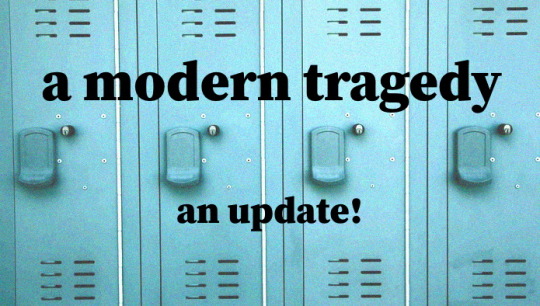
(original image credit to @/theyshane on unsplash)
a month or so ago the wonderful and very sharp-fanged @yvesdot said i should make a post about the process of Working On A Podcast - what, exactly, does that entail? and so today i set down upon your table a long post about the process of this podcast, its unique struggles, and What Comes Next!
for those of you who are new here: a modern tragedy is my podcast-in-progress, a loose retelling of three of shakespeare’s plays (romeo&juliet, hamlet, and macbeth) set in a modern-day high school. or, alternatively, “so so much drama localized inside a few overlapping friend groups of gay* people”
post under the cut!
tag list (ask me to be added/removed): @piyawrites @harehearts @bisexualorlando @guulabjamuns
*well. gay people and indrajit “macbitch” chopra. never let it be said i don’t have cishet rep 😤
what i mean when i say “podcast”
sometimes when i say, “i’m writing a podcast,” people get the wrong idea - they think i’m going to sit down, maybe with some friends as guest stars, and talk into a microphone for an hour. what i really mean is that i’m writing a fiction podcast - something like an audio drama, if you will.
i’ve had this story concept for a long time (since i realized i was gay, actually. sometime around my coming out i was like “...sapphic romeo and juliet. oh i’m a genius”), but it never really worked as a novel. my inspiration for making it a podcast was the penumbra podcast! which i am not caught up on but which dragged me shirt-collar-first into the world of podcasts. [blowing a kiss to mars] for juno steel.
i will admit that i actually... haven’t listened to a ton of podcasts. mostly because my incredibly helpful attention-deficit brain said listening to things is impossible forever. but let me tell you that starting to write AMT in script format worked immediately. and in hindsight? it makes sense. i mean, i am retelling some of the most famous plays of all time... why not get a little theatrical with it?
the process so far
the podcast is drafted! all 16 episodes of it. all... 176k words of it... only took me a year and a half...
i have my main cast together! AMT has a lot of side characters, not all of whom are cast yet, but my main recurring squad is gathered and i love them all VERY dearly. (also, the population of people i know irl is 75% theater kid. so i think i will be able to figure out the side character thing.)
within the group of voice actors, i also have three assistant directors, a term i use loosely because mostly i just mean… those are my right hand men. the main folks i bounce ideas off of and the main folks i have helping me organize all of this. i’ve said multiple times that i’m just the keyboard monkey and would be hopelessly out of my depth without my beloved assdirectors. (shoutout to @asimpleram, the only one who uses tumblr, you are my best friend and i love you oh so much)
i also have two “bootydirectors” who gave themselves that name and that’s just the people who know the most about recording technology and acting. thanks kings
right now the scripts have been sent out to some sensitivity readers and i am currently editing! (both with regards to sensitivity reader feedback, and also just editing the plot and character arcs in general.) (if you want me to send you AMT and you’re willing to give me your thoughts i will straight-up send it to you honestly just know it’s LONG)
i actually did not consider that writing this might be uniquely hard before i started
fun max tip: if you look too far ahead down the road and realize the breadth of the project you’re taking on you’ll freak yourself out so just dive into things headfirst without checking both ways or considering your actions!!! [i am giving you a double thumbs up from behind my monitor]
i have never written anything like AMT before! it has been an experience! there have been some unique struggles!
working with other people is harder than i expected! which is not about my group, all of whom are lovely people. it is about me and my little OCD rat brain that hates letting go of control. even though... an inherent part of writing a script... is that at some point other people will be involved... wild, i know.
9 main characters! AMT has 9 main characters. this is somewhat excusable because the whole thing is episodic and more like a season of a tv show than a novel. but still. 9 main characters. why did i do that
i’ve never written episodically before, so i’ve had to figure out how to fit the plot into appropriately spaced intervals. there are three running plotlines (one for each play), and they’re all parallel and eventually convergent. so everything’s happening at once and it’s… hard to make episodes that aren’t just “max threw a bunch of scenes together because they were happening at the same time.” (i will admit i’ve defaulted to chronological order when spacing episodes, so the timeline doesn’t get confusing. but i hope each episode is cohesive on its own.)
balancing the tragedy and comedy in tragicomedy has been… interesting. i do to some degree feel like AMT’s gone darker than i initially imagined it; while it’s a high school retelling of these plays (and thus there’s no. there’s no murder. the only person who dies is isaac’s dad and that’s six years precanon), all three plays deal to differing degrees with suicide, among other things, and it felt… disingenuous not to write about that from a modern high schooler’s perspective.
i can guarantee a long-term happy ending for AMT! i cannot guarantee much about what’s in the middle. (there are sixteen episodes; one of my directors likened episode 7 to a five-act play’s third act, when things really start to… hit the fan. he’s right and i’m obsessed with thinking about it that way)
the massive amount of time i have been working on the thing: i started writing this podcast in january 2019. i finished writing it this past summer (2020). that’s two summers that have passed without my recording it (which is obviously easier to organize in the summer… or it was before covid but you get my point). this is… a little disheartening? i don’t know; oftentimes i underestimate how long writing projects will take me. what it comes down to is my urge to put out content vs. my urge to make it perfect…
…especially since i’m technically competing with one william f. shakespeare. (the f is for fucking.) i mean, dear old billy shakes DID write the plot out for me ahead of time, which i appreciate, but still…
AMT is absolutely consumable if you don’t know the first goddamn thing about shakespeare’s works. that said. i assume some of the people who will listen to it are shakespeare enthusiasts, casual or otherwise, and that’s a little terrifying! AMT is a shakespeare retelling, but i’ve made these characters very much my own, and i suppose i worry about how others will approach that, and whether they will disagree with my interpretations, or the way i’ve adapted the plots, and so on and so forth... i just have to live with this one, honestly. i think i could edit AMT for a thousand years and probably still find something to change about it, so i will simply have to get over myself.
that said, i don’t regret the amount of time i’ve spent on it! i think the time i’ve taken to draft and edit these episodes has been well worth the wait; i’m genuinely very happy with what i’ve created, and whether or not you agree with, say, my interpretation of a modern hamlet family dynamic, i hope it’ll still be enjoyable!
so what’s next?
as i said earlier, the scripts are currently in the hands of sensitivity readers, and i’m editing!
over the summer, the cast met on zoom frequently to read through and rehearse scenes. and i will not lie it was the most fucking fun i’ve had this entire wretched interminable year. i am constantly charmed and befuddled by the feeling of Listening To My Words Read Out Loud By A Human Voice and also i love my friends so very much
we have a tentative plan to gather the cast (socially distanced and responsibly, of course) over thanksgiving break to make some actual stabs at recording! i am too afraid to concretely promise AMT Episode 1: Fortune’s Fool by the end of 2020 but like… i’m not NOT promising it! send me your finest vibes. we’re close.
#max.txt#amt tag#the amt cast has a blursed discord server which i have not posted a link to publicly because it’s mostly people i know irl#but if you're one of the folks who's read all of amt which is... a few of you... and you want into the server... dm me#we used to use it to organize rehearsals but now that school's started it's mostly just been me complaining about editing i won't lie#max shouts into the void in his personal liveblog channel while 90% of the cast is offline#anyway i reread this post like three times to make sure it makes sense because i'm illiterate <3
21 notes
·
View notes
Text
They Never Teach You How to Stop
Rarely do I lack the words to express myself. Perhaps this reflects my failure to maintain my journal consistently throughout 2020. Here goes an honest attempt to capture and document my mental state and the fatigue of Covid, the inertia of this shelter-in-place, the anxiety of this political crisis we face as a nation, the pressure of being a 1L in law school against the backdrop of civil unrest and Justice Ginsburg’s death, coming out - my dad told me he was disappointed -, the possible erosion of my relationship with someone I love, and this feeling of absolute dread and resentment for a system that continuously fails my and future generations (robbing us of a social contract that promised life, liberty, and the pursuit of happiness), among many other things I’m too tired to consider. When did we accept a $0 baseline as the American Dream? Oh, to be debt free - free from this punishment for having pursued an education. Stifling the educated to prevent them (myself included) from organizing and mobilizing the masses so we can supplant this system with a better one is the overall objective of the oppressive class (read: Pedagogy of the Oppressed); it’s the conflict between the bourgeois and the proletariat. The proletariat has swallowed the middle class, leaving only the ruling class. I am essentially on autopilot, forcing myself to go through the motions so I can survive another day. I know others join me in this mental gymnastics of unparalleled proportions, one social scientists and medical researchers will soon study and subsequently publish their findings in an attempt to explain the unexplainable. Despite a lack of air circulation, we are breathing history; the constitution, like our societal norms, must adapt accordingly. Judge Barrett: there is no place for originalism. While I seldom admit weakness or an inability to manage life’s curveballs, this series of unfortunate events seems almost too much to bear.
And yet somehow I continue to find the energy to submit assignments due at 11:59 p.m., write this post at 1:38 a.m., “sleep”, wake at 7 a.m. so I can read and prepare (last minute!) the assigned material leading into my torts or contracts class. I find the energy to text my boyfriend (or ex-boyfriend) so I can attempt to salvage the real and genuine connection we have, cook elaborate meals to find some solace, wrestle with whether or not to hit my yoga mat (I don’t), apply to a fellowship for the school year and summer internships, prepare my dual citizenship paperwork, manage a campaign for two progressive politicians, and listen to music in an attempt to stay sane . . . ~*Queues John Mayer’s “War of My Life” and “Stop This Train”*~ . . . I realize I have to be kinder to myself, give credit where credit is due. I hate feeling self-congratulatory though.
Mostly, I am too afraid of the repercussions if I stop moving at a mile/minute, that I can just work away the pain and be the superhuman who numbs himself from the low-grade depression and nervous breakdown. My body tells me to slow down, as evidenced by the grinding of my teeth, but I take on more responsibility because people rely on me. I must show up. I am a masochist in that way. This is what I signed up for and I’ll be damned if I don’t carry through on my promise to do the work. Pieces of my soul scattered about like Horcruxes, though they’re pure, not evil, so I hope nobody resolves to destroy them.
My mind rarely rests. It’s 3:08 a.m., one of the lonelier hours where night meets morning; it’s the hour for and of intense introspection. It makes you consider pulling an all-nighter, one you reserve for an “important” school or work deadline. We always put our personal lives on the back-burner. 3 a.m. sets the tone for a potentially awful day. But that doesn’t matter right now. I’m letting some of my favorite albums play in the background: Joni Mitchell’s Blue, Mac Miller’s Circles, Rhye’s Blood, Alicia Keys’ ALICIA, Coldplay’s Ghost Stories, Frank Ocean’s Blonde, Miley Cyrus’ Dead Petz in addition to other playlists, Tiny Desk performances, and tracks (I unearthed last week, like When It’s Over by Sugar Ray). I need to feel something. I need to feel anything. I need to feel everything. We experience such a broad spectrum of emotions throughout the day that we lose track of if we don’t pause to absorb them. Music reinforces empathy; it releases dopamine.
I spent the past two hours reading through old journals and posts, as scattered as they were, on a wide range of topics: poems I had written about falling in and out love, anecdotes about my world travels, and entries on personal, political, and professional epiphanies. The other night I found one of my favorites, a previous post from my time living in Indonesia, centering on the dualities of technology. It resonated with me more than the others. To summarize, I wrote about my tendency to equate the Internet with a sense of interconnectedness (shoutout to Tumblr for being my digital journal; to Twitter for being a place of comedy and revolution; to Instagram for curating my *aesthetic*; to Facebook where I track my family’s accomplishments and connect with travel buddies displaced around the globe all searching for a home). And yet I feel incredibly lonely and disconnected whenever I spend too much time using technology, so much so that I set screen time limitations on my phone recently to curtail this obsession with constant communication and information gathering. Trump and Biden admitted that it’s unlikely we’ll know the results of the election on November 3rd during their first presidential debate. Push notifications don’t allow us to learn of trauma within the comforts of our own homes. I’m already fearing where I will be when that news breaks.
This global pandemic and indefinite shutdown of the world (economy) undeniably exacerbates these feelings. This is some personal and collective turmoil. But I was complicit in the endless scrolling and swiping of faces and places long before Covid-19. Instead of choosing to interact with my direct environment (today’s research links this behavior to the same levels of depression one feels when they play slot machines), I am still an active on all these platforms, participating the least in the most tangible one: my physical life. I am tired of pretending. I am tired of being tired. I am tired of embodying fake energy to exist in systems that fail me. I am tired of the quagmire. Like Anaïs Nin, I must be a mermaid [because] I have no fear of depths and a great fear of shallow living. This particular excerpt from that 2016 entry was difficult for me to read: “The fantasy of what could have been if a certain plan had unfolded will haunt you forever if you do not come to peace with the reality of the situation. I hope you come to terms with reality.” I am not at peace with my current reality. But is anyone?
It’s a bit surreal for my peers to have suddenly started caring about international relations theory. It’s transported me back to my 2012 IR lecture at Northeastern: are you a constructivist or a feminist? Realist or liberalist? Neo? Marxist? The one no one wants you to talk about. Absent upward mobility, this is class warfare. But I cannot be “a singular expression of myself . . . there are too many parts, too many spaces, too many manifestations, too many lines, too many curves, too many troubles, too many journeys, too many mountains, too many rivers” . . . It feels like America’s wake-up call. But I know people will retreat into the comforts of capitalism if Biden wins and, well, we all enter uncharted waters together if the Electoral College re-elects #45. For those who weren’t paying attention: the world is multipolar and we are not the hegemon. Norms matter. People tend to be self-interested and shortsighted. Look to the past in order to understand the future. History, as the old adage goes, repeats itself. Once a cheater, always a cheater. Taxation without representation. Indoctrination. Welcome to the language of political discourse. Students of IR and polisci have long awaited your participation. Too little too late? Plot twist: it’s a lifelong commitment. You must continue to engage irrespective of the election outcome or else we will regress just as quickly as we progress. Now dive into international human rights treaties (International Covenant on Civil & Political Rights; International Covenant on Economic, Social, and Cultural Rights), political refugees, FGM. No one said it wasn’t dismal. But it’s important. We need buy-in.
While I am grateful for the continuation of my education, for this extended time with family, for this opportunity to be a campaign manager for two local progressive candidates (driving to Boston to pick up revised yard signs as proof that the work never stops), it would be remiss of me, however, not to admit that I am lonely: I am buried in my books, in the depressing news both nationally and globally, and in precedent-setting Supreme Court cases (sometimes for the worst, e.g. against the preservation of our environment). In my nonexistent free time I work on political asylum cases, essentially creating an enforceability framework of international law, for people fleeing country conditions so unthinkable (the irony of that work when my country falls greater into authoritarianism and oligarchy is not lost on me). I am fulfilling my dream of becoming a human rights lawyer which stems back to middle school. I saw Things I Imagined (thank you Solange). I have held an original copy of the Declaration of Independence that we sent to the House of Lords in 1778 and the Human Rights Act of 1998 while visiting the U.K. Parliamentary Archives as an intern for a Member of Parliament. This success terrifies and exhausts me; it also oxygenizes and saves me. Every decision, every sacrifice, has led me to this point.
“It’s the choosing that’s important, isn’t it?,” Lois Lowry of The Giver rhetorically asks. This post is not intended to be woe is me! I am fortunate to be in this position, to have this vantage point at such an early age, and I understand the whole is greater than the sum of the parts. My life has purpose. I am committed to the work that transcends boundaries; it is larger than life itself. It provides a unique perspective. But it makes it difficult to coexist with people so preoccupied in the drama they create in their lives and the general shallowness of the world we live. It feels like there is no option to pump the brakes on any of this work, especially in light of our current climate, and that pressure oftentimes feels insurmountable. Time is of the essence. It feels, whether true or not, that hardly anyone relates to my experience, so if I don’t carve out this time to write about it, then I am neither recording nor processing it.
Tonight, in between preparing tomorrow’s coursework, I realize that I have an unprecedented number of questions about life, which startles me because typically I have the answers or at least have a goal in mind that launches me into the next phase of life or contextualizes the current one. These goals, often rooted in this capitalistic framework, in this falsity of “needing” to advance my career as a means of helping people, distract me from asking myself the existential questions, the reasons for why we live and what we fundamentally want our systems to look like; they have distracted me from real grassroots community organizing until now. They distract me from the fact that, like John Mayer, I don’t know which walls to smash; similarly, I don’t know which train to board. Right now feels like we are living through impossible and hopeless times and I don’t want to placate myself into thinking otherwise despite my relatively optimistic outlook on life. As we face catastrophic circumstances – the consequences of this election and climate change (famine, refugees, lack of resources) – I do not want to live in perpetual sadness. I am searching for clarity and direction so I can step into a better, fuller version of myself.
It’s now 3:33 a.m. Here is the list of questions that I have often asked myself in different stages of life, but recently, until now, I have not been willing to confront for fear that I might not be able to answers them. But I owe it to myself to pose them here so I can have the overdue conversation, the one I know leads me to better understanding myself:
Are you happy? Why or why not?
What do you want the future to hold? What groundwork are you going to do to ensure it happens?
What does your ideal day/week/month/year/decade look like? Why?
With whom do you want to spend your days? Why?
Who do you love and care about? Have you told people you care about that you love them? Does love and vulnerability scare you?
What do you expect of people – of yourself, of your partner, of your family, and of your friends? Should you have those expectations? Why or why not?
What do you feel and why?
What relaxes you? What scares you? What brings you joy?
What do you want to improve? Why?
What do you want to forgive yourself for and why?
Does the desire to reinvent yourself diminish your ability to be present?
Do you have a greater fear of failure or success? Why?
How do you escape the confines of this broken system? How do you break from the guilt of participation in it and having benefited from it?
How do we reconcile our daily lives with the fact that we’re living through an extinction event? This one comes from my friend (hi Jeanne) and a podcast she listened to recently.
How do you help people? How do you help yourself? Are you pouring from an empty cup?
How will you find joy in your everyday responsibilities, in the mission you have chosen for yourself? What, if any, will be the warning signs to walk away from this work, in part or in its entirety? Without being a martyr, do you believe in dying for the cause?
So here are some of the lessons I have learned during this quarantine/past year:
“I’ve Got Dreams to Remember,” so do not take your eyes off them. Chasing paper does not bring you happiness.
Be autonomous, particularly in your professional life.
Focus on values instead of accolades.
Do everything with intention and honest energy.
Listen to Tracy Chapman’s “Crossroads” & Talkin’ Bout a Revolution for an energy boost and reminder that other revolutionaries have shared and continue to share your fervent passion . . . “I’m trying to protect what I keep inside, all the reasons why I live my life” . . . When self-doubt nearly cripples you and you yearn a few minutes to run away when in reality you can’t escape your responsibilities, go for a drive and queue up “Fast Car” . . . “I got no plans, I ain’t going nowhere, so take your fast car and keep on driving.”
With that said, take every opportunity to travel (you can take the work with you if absolutely necessary). Go to Italy. Buy the concert ticket and lose yourself in the moment. Remember that solo excursions are equally as important as collective ones. But, from personal experience, you prefer the company. Find the balance.
Detach from the numbers people keep trying to assign to measure your personhood.
Closely examine the people in your inner circle and ask them for help when you need it.
“And life is just too short to keep playing the game . . . because if you really want somebody [or something], you’ll figure it out later, or else you will just spend the rest of the night with a BlackBerry on your chest hoping it goes *vibration, vibration*” (John Mayer’s Edge of Desire) . . . so love fiercely and unapologetically.
Be specific.
Go to therapy even when life is good.
#reflection#covid#quarantine#late nights#music#revolution#diary#politics#john mayer#alicia keys#tracy chapman#love#dear diary#travel#writing#personal#mental health
8 notes
·
View notes
Text
Why am I obsessed with Tinkerence? Glad you asked.
To begin with...Tinker Bell’s character in the original story and therefore most adaptations is defined by her unrequited love. She would both kill and die for the one she loves, and that boy doesn’t love her back. In fact, he kind of forgets she exists within the year she (presumably) dies. (Referencing Barrie canon. The rest of this analysis is Disney based so discount that bit but I’m just making a point...)
Of course, it’s not her object of affection’s fault for not returning her feelings--he doesn’t really have it in him and even if he did he wouldn’t be required to love her back. But the way he treats her even as a friend can not be defined as high regard. He will say she’s the best fairy, and that she means more to him than anyone in the world, but actions speak louder than words. He will snap/yell at her, pluck her out of the air by the wing to spank fairy dust out of her unwillingly, swat her away when she’s bothering him and just generally prove through his actions that he’s none too concerned with her feelings. He may love and appreciate her in his own way, in what way he can, but it’s not really good enough for Tink.
When she has her heart broken by Peter Pan, she’s ashamed for more than one reason. She felt betrayed by his sudden lack of interest in her when he brought Wendy to Never Land and spent all his time with her, but she also felt like a betrayer to herself. To her talent, which had gone overlooked and unperformed as she left Pixie Hollow to live with the lost boys. Her old friends--they were terrified even years after she had returned home that if she went on an adventure with Peter again, she wouldn’t come back. They cried.
Tinker Bell hadn’t even told anyone of her feelings for Peter for a long, long time when she came back—the most they knew was that she’d spent time with or was friends with him. She confessed to Mother Dove so, so many years after the fact, that Wendy’s great (great?) granddaughter was near the age to be brought to the island by Peter by that time. And she had become friends with Rani only a few years before that, her first true friend (that she let in, at least) since returning to Pixie Hollow...
Do you know when Peter brought Wendy? 1904. Do you know when Tink finally released her secret to Mother Dove? 2005. A hundred years she spent heartbroken and alone.
Meanwhile, there was one fairy who cared more about Tink than anyone else, and who must have forgiven her for disappearing the moment she returned though she didn’t seem to have rekindled her relationships with Sil, Fawn, Ro and Dess until after she became close with Rani, Prilla, etc. and opened up more.
One fairy who she had steadfastly ignored, because she’s gotten her heart broken before, and didn’t want to endanger it again. Terence. Her first best friend. The sparrow man about whom she answered with a shy “uhhh” when asked once whether they were dating. The one she might have had feelings for before she ever met Peter, but they never defined their relationship past being friends and so it was too late even if she did.
For so long, Terence admires Tink and respects her, and cherishes her, and she refuses to acknowledge his feelings or see his charming smiles toward her, because she is So Viscerally Aware of how bad it hurts to be heartbroken. Because she knows that if she opens up to him and looks at him as a friend, as more than a friend, she’s opening herself up to being hurt again. Because she equates being in love with being broken.
When the fairies get hold of a wand, Tink makes a wish in her bitterness for Peter to fall in love with a clamshell, and Terence makes a wish in his desperation for Tink to like him romantically. She tells him that she broke Peter, and he broke her, but she doesn’t want to be fixed. When he tells her he’s going to reverse the wish, because he didn’t want to take away her choice in her true feelings, she laments that when the romance is gone from her feelings, she will miss him, but she won’t even know that she misses him.
Eventually, there’s a day when they’re separated for hours (they have to capture a dragon, it’s a long story. And there are often situations where Terence is close to a near death experience, or suffering some grievous injury, but his only thoughts are of Tink’s safety. He would do anything for her.)
When they’re separated, there’s an off-page moment where Tink admits that she missed Terence. Now they’re closer than before, she’s blushing at his compliments, and the protagonist says “Good for him at last” indicating that they’ve finally entered a new stage of their slowest-ever-burn relationship.
Terence’s story throughout the series is one of unrequited love, not because the recipient is unable to return the feeling, but by choice. Because she feels too strongly and is afraid of losing her own heart in the process of she lets it happen. Through some of the books, we see moments in which Tink reflects on how much Terence means to her and how she likes him, only to immediately become frustrated and try to push him away. Because she doesn’t want to feel this, she doesn’t want to love anyone again.
She lets him in little by little, he shows up to her workshop often with things for her to repair, they play fairy games together. And eventually he just becomes such a part of her life that she can’t help but miss him the moment he’s gone, even if she doesn’t want to admit to feeling anything more than friendship. It takes a long time before she realizes that it might be okay to let herself be in love, because there’s no one in whose hands her heart would be safer.
And what’s the point of protecting your heart from breaking if it’s aching to be with the one you’re refusing to let in? Might as well take the chance, because you’re hurting either way.
That’s when Tinker Bell finally got her biggest character growth, when she let herself move on and be happy. She doesn’t have to be broken or closed off, she can experience all the joy and love she’s always desired. She can experience the belonging as well as the adventure, having her talent and eating it too. And it’s warm, and bright, and wonderful, and soft.
That’s why Tink/Terence is so special to me, because it’s a combination of friends-to-lovers, hurt/comfort, slow burn, mutual pining as well as unrequited pining, and just every heart-aching sweet trope.
I haven’t even gotten into the chemistry, the dynamic between the two which makes me really feel like they are soulmates, because this is what matters more. Tinker Bell chooses happiness.
Fully knowing the risk, trusting her heart to another, Tink chose Terence. And this romance is very important because as much as her jealousy once defined her and controlled her, her heartbreak then defined and controlled her, the fact that she ultimately chose HAPPINESS and LOVE for her future defines her now. She finally had a choice in the matter and now she controls it herself rather than allowing it to control her.
That’s who the best version of Tinker Bell is, and that’s why I love Tinkerence.
#my phone literally ran out of battery bc of how long i spent ranting this earlier#⊹*⋅✧ | ᶦ ʷᵒᵘᶫᵈᶰᵗ ᵐᶦᶰᵈ (tink x terence)#⊹*⋅✧ | ᵖᵒᵗˢ ᵃᶰᵈ ᵖᵃᶰˢ (df verse)#⊹*⋅✧ | ˢᵉᶜᵒᶰᵈ ˢᵗᵃʳ ᵗᵒ ᵗʰᵉ ʳᶦᵍʰᵗ (disney verses)#anyway im sure nobody will read the whole thing but the ending is the best part#it's where i really drive the point home
23 notes
·
View notes
Text
Rebecca: Leaving Hitchcock Behind for Something Darker
https://ift.tt/37sEQVx
This article contains spoilers for the film and book versions of Rebecca.
Leave it to Ben Wheatley to remake Alfred Hitchcock. The younger British filmmaking iconoclast has been nothing if not provocative with his filmography so far, which includes the disturbing horror-crime hybrid Kill List (2011), the serial killer black comedy Sightseers (2012), the psychedelic, very weird A Field in England (2014), and the unsettling dystopian nightmare, High-Rise (2015). But with Rebecca he takes on not just a classic Hitchcock film, but the master’s sole Best Picture winner. Why not, right?
We’re being facetious, of course. Wheatley’s version of Rebecca (now on Netflix) is not a remake of the 1940 film but a new adaptation of the 1938 novel by Daphne du Maurier on which it is based. Both films are mostly faithful to the book (with a couple of notable exceptions), but Wheatley and his screenwriters (Jane Goldman, Joe Shrapnel, and Anna Waterhouse) coax a moral ambiguity and feminist twist out of du Maurier’s multi-layered Gothic romance that wasn’t permissible in the 1940 film.
“I mean, it’s the same conversation I have about every film,” Wheatley says when we ask him over Zoom what drew him to the project. “It’s like, ‘Oh it’s a comedy. The last one you did was a horror film,’ or, ‘Oh it’s a fashion movie and last thing you did was a family drama,’ or whatever. I try and choose stuff that’s at 90 degrees from the last thing I did every time, and I’ve been lucky enough to do that.”
Wheatley adds that reading the script led him to rethink his assumptions about the story and the Hitchcock film. “What attracted me to it was initially Jane Goldman’s script,” he explains. “When I read it, I was really surprised by it. I felt all the twists and laughed at all the right bits of it. And that surprised me doubly because I had seen the Hitchcock film and I’d read the book. So I thought that was really odd, that I would misremember it in that way. I talked to a few other people and they were kind of like, ‘Yeah, Rebecca. It’s just this beautiful romance, isn’t it?’ And I’m like, ‘No. That’s not the half of it.’”
It’s fair to say that Rebecca deceptively starts off as a “beautiful romance.” In the new film–as in the book and the 1940 version–the main character is an unnamed young woman (played now by Lily James), who is working as a personal assistant to a wealthy older American (Ann Dowd) on holiday. In Monte Carlo, the young woman meets Maxim de Winter (Armie Hammer), also rich, who is quite dashing and recently widowed.
The two strike up a whirlwind courtship that results in de Winter whisking the young woman back to his ancestral estate, Manderley, as the new Mrs. de Winter. But once ensconced there, she discovers that the house is permeated with the lingering presence of her predecessor, Rebecca, who still commands the unhealthy loyalty of the mansion’s housekeeper, the sinister Mrs. Danvers (Kristin Scott Thomas). It is here that Rebecca pivots from romance to thriller, with the plot turns and psychological subtexts piling up like the waves crashing at the bottom of the treacherous cliff upon which Manderley sits.
“When I reread [the book], I just imagined du Maurier had written Rebecca as a dare or something,” says Wheatley. “That it was kind of, ‘You like romantic fiction? Well, I’ll write a book that will stop you reading romantic fiction forever. I’ll take the tropes of it, which is the widower and the holiday romance, and the rags to riches, and then I’ll really smash it and rub your nose in it.’ I loved it.”
In the book and both versions of the film, it’s revealed that Rebecca was not the perfect wife and society hostess that she was reputed to be. In fact, she was a cruel, selfish woman who claimed to Maxim on the night of her death that she was pregnant with another man’s child and would force Maxim to raise it as his own, a revelation that leads her tormented husband to shoot her dead. He disposes of her body at sea, but when the corpse washes up a year later, Maxim reveals the truth to his new wife.
Hitchcock’s film, due to the moral decrees of the Hays Production Code that was in existence at the time, had to change Rebecca’s death to a suicide since movies were not allowed to show murderers going unpunished. Under no such constraints, Wheatley takes his Rebecca a step further: The new Mrs. de Winter evolves into a protector of her husband, taking action to clear his name while at the same time fully aware that she is complicit in the cover-up of a murder.
“The moral structure of it is very different because of the things that were missing from the ’40s adaptation due to the Hays Code,” says Wheatley. “So the actual heart of the book is the idea that Maxim de Winter has murdered his wife and that you then side with de Winter and the second Mrs. de Winter as an audience member, and basically root for them to win throughout the rest of the story–which is utterly despicable. But I thought that that felt like a good reason to revisit it.”
His reasons to approach the source material aside, Wheatley knew he might touch some kind of third rail of cinema by taking on a story that the general public remembers as a Hitchcock masterpiece (it didn’t work out too well for Gus van Sant and his 1998 remake of Psycho, which like the original was also based on a novel). Getting all that noise out of his head was the first step Wheatley took.
Read more
Movies
The Best Netflix Original Movies Available to Stream Now
By Caroline Preece
Movies
10 Best Alfred Hitchcock Movies
By Michael Leader
“Right at the beginning of the process I went, ‘Oh, right. I’m going to get a kicking for this,’” he says with a laugh. “And then I didn’t think about it anymore and I made the film. I put it right to the back of my head.” But the subject inevitably came up as the director began promoting the film. “I saw the reviews [and it was like] ‘Oh my God. It’s all about Hitchcock.’ But that’s inevitable. It’s fine. The audience that’s there for this movie is a much bigger audience than just the audience of people who’ve seen that version of it.”
Wheatley says he’s less concerned with his movie being compared to Hitchcock’s than feeling as if he did justice to the novel. “I had a lot of questions about filling the shoes of Hitchcock and all this,” he remarks. “It really isn’t about that. It’s filling the shoes of du Maurier. That’s the challenge and the fear of taking a book that is so beloved and so central within a culture in lots of ways and so influential. To take that and balls that up is the problem. The other adaptation is done and everyone loves it. There’s going to be no shifting of that from the pedestal of cinema history by anything I did.”
Of course Wheatley wasn’t the only one dealing with the ghosts of adaptations past. His trio of leads–James, Hammer, and Thomas–took on characters first embodied on the screen by Joan Fontaine, Laurence Olivier, and Dame Judith Anderson.
“With Lily, we talked a lot about the agency of the character,” says Wheatley when asked how he approached each actor about their roles. “But there’s the aspect of the book where you don’t know if you believe what the first-person narrative is saying. She says she’s very weak, but at the same time her actions are strong. So is she slightly self-serving in how she talks about herself? And is the whole truth there?”
He continues, “That’s the craft, I think, of Lily James’ performance, trying to be nervous and terrified, but also not capsizing the movie by being irritating or being too confident or strong.”
Kerry Brown / Netflix
As for Hammer’s portrayal of the equally enigmatic Maxim de Winter, “It was more the other way around of taking someone from the position of being completely in control and being like a matinee idol and then just destroying them over the period of the movie,” Wheatley says. “But then as usual, the film is not shot in chronological order. So it’s an absolute nightmare to track all those kinds of performances. But that’s basically what we talked about a lot.”
When it came to casting Mrs. Danvers, perhaps the most iconic of the story’s three leads, Wheatley says he was “totally” enraptured with the idea of the great Kristin Scott Thomas taking on the part. “This version of it is a kind of more sympathetic Danvers,” he reveals. “I think that had come out of reading it and going, ‘I feel like she’s the moral center of it in many ways.’ There was a lot of quite complicated emotional stuff that she had to do–to go from being stern to being vulnerable, from beat to beat to beat. And I think that it took someone of her kind of pedigree to be able to do that.”
Whether viewers come to the new Rebecca with their own memories of the book or the original movie, or tune into Wheatley’s version with no preconceptions in mind, the director thinks that a new version of the story, some 82 years after the book was first published and 80 since the release of Hitchcock’s film, could have a different impact on new generations of viewers experiencing it for the first time.
cnx.cmd.push(function() { cnx({ playerId: "106e33c0-3911-473c-b599-b1426db57530", }).render("0270c398a82f44f49c23c16122516796"); });
“I think every film that you make is putting the film through your experience of the moment,” he explains. “So I think that there are things that are happening now which become more pertinent, and there’s also general universal truths. The idea of, what is your history of your own partner? How do you deal with the jealousy of that and the obsession? What would you do in this situation? How do you compete with ex-partners? That kind of stuff. It’s also a tale of privilege, of someone who can float through life because they’re good-looking and rich, and they do what they like and get away with murder.”
Rebecca is streaming now on Netflix.
The post Rebecca: Leaving Hitchcock Behind for Something Darker appeared first on Den of Geek.
from Den of Geek https://ift.tt/31voJD7
2 notes
·
View notes
Text
#65 Beauty and the Beast (2017)
I’m burning through my Disney+ subscription, and instead of this forever cursing my drafts section until I work my way through the other lower movies on this list, you’re getting this one now.
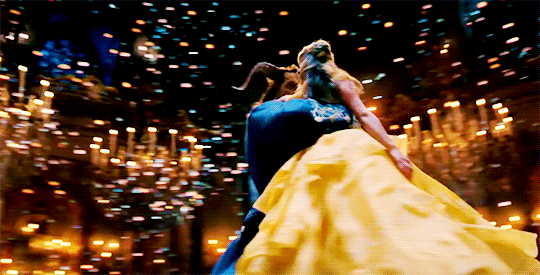
Beauty and the Beast was my favorite Disney movie as a child. Belle was smart, she read a lot, and she was a bit of an outcast, which were my only identifiers as a wee lass (other than being obnoxious and constantly having tangled hair). I'm going to bet that this movie is the reason so many girls my age went through a Paris phase in their tween years. I did take 3 years of high school French that I have almost no memory of.
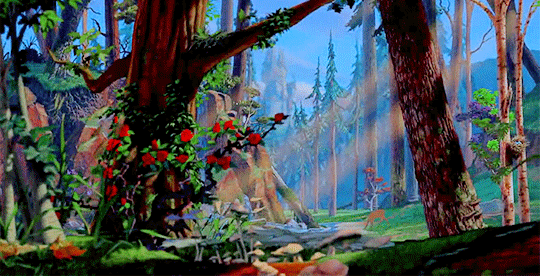
The original's animation is gorgeous, the songs by Alan Menken and Howard Ashman are iconic, and the romance between two people who learn how to trust and support each other... it's probably the reason why I've stayed in terrible relationships for way too long. My father took me to see this movie in theaters when I was 6, and it is the first movie I remember crying during out of sadness. There I was, while the Beast was dying, trying to hide the fact tears were streaming down my face because I didn't want my dad to see I was crying and not take me to see another movie again. When they adapted it for Broadway, I listened to that soundtrack over and over... "Home" was my favorite song, and the end still makes me cry like a 6-year-old. It's perfect.
I had attempted to watch this remake once before. I hated it so much I started drinking, and then peaced out so hard when Lumiere started moving that I had to watch Moana to normalize myself. Visually, this movie is what happens when the Uncanny Valley turns into the fucking Grand Canyon. Little did I know that this movie gets worse... much worse... as it goes on, and that Stephen Chbosky, the author and director of The Perks of Being a Wallflower made it this way. A man who wrote one of my most beloved novels and movie adaptations helped in creating this narrative monstrosity, and that, out of all of this, was the deepest cut of all.
I'm not rehashing the plot, because I have too much to say about why this remake shouldn't exist, and I’m going to guess you’ve either seen the movie or are familiar with this almost 300-year-old story. It took the source material and just murdered it in its attempts to update it. I'm going to start positive and work toward the biggest issue I had with it, because I'm currently writing angry and that never turns out well for me.
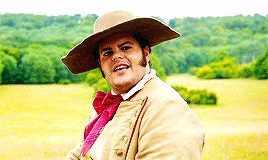
Things I liked:
This may be controversial, but I did like Josh Gad's performance as LeFou. I'm not saying what LeFou did made any sense (he suddenly was upset Gaston was making things up again?), but as an actor, Josh Gad was working with what he had, and I think he owned it.
Chip's introduction to Maurice - I actually paused the movie because I was laughing so hard.
The piano playing the funeral march when it tackled LeFou.
When Mrs. Potts said Chip smelled good when he turned back into a little boy. It was a cute little detail.
The guillotine joke in "Be Our Guest" and the Les Miserables barricade reference.
I actually thought Cogsworth was adorable for being a CGI nightmare. I don't know how much of my opinion of this was influenced by the voice of Ian McKellan.
I really liked the costumes, except for Belle's gown, which was definitely a downgrade. Micarah articulated the issues with it perfectly.
Celine Dion singing the credits song was a nice homage to her cover of "Beauty and the Beast", although it sucks she's associated with this nightmare of a remake.
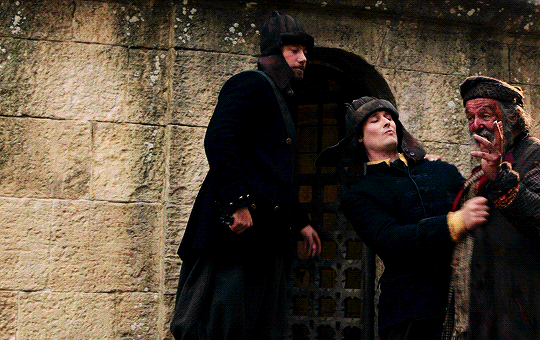
Little quibbles:
Whatever they did to Emma Watson’s voice made her sound like a robot.
Almost all the CGI, especially the Beast, was completely unsettling. The wardrobe was the worst of it, holy shit.
They went out of their way to explain plot holes like "Why don't the villagers remember the castle?" or “Why is it snowing when it looks like the middle of summer in the village?” or "How did Belle get the Beast up on that horse?" when none of that really matters to the overall narrative.
The reaction to Belle teaching a little girl how to read was unbelievably eye-roll inducing. Lindsay Ellis' video on this is so fucking good, watch it now - You don't have to read the rest of my ramblings if you do. #beastforshe
Ariana Grande slurring her way through "Beauty and the Beast".
It was nice to see Maurice updated from a manic inventor to a level-headed, sweet, competent, reserved man who treats his daughter like an equal. Clock-maker Maurice that actually takes care of Belle reads better to me, and I like how they had him wander into the garden to get a rose for her - it's a nice callback to the original story. The problem with doing this, however, is it negates the "crazy old Maurice" narrative that plays heavily into why the villagers don't believe his tale of the Beast in the first place. If Kevin Kline, a put-together man (up until this point), wandered into the tavern looking disheveled and conveying a story about his daughter being kidnapped, I'd be like, "Shit, Maurice, what did you see?!". But instead, the story goes out of its way to put him at the mercy of Gaston, and shoehorn in an attempted murder plot to really turn everyone against him - it's bizarre.
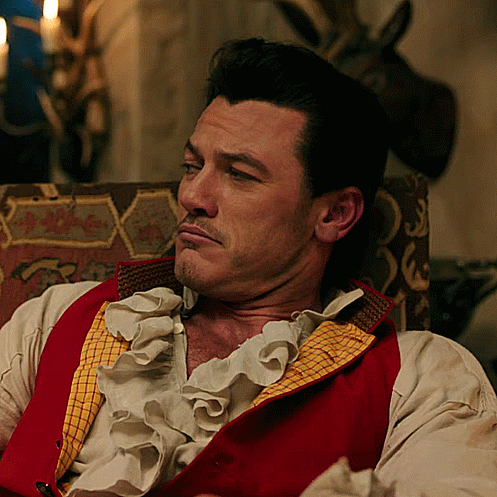
Medium quibbles:
Gaston went from being a well-liked, athletically inclined dude to a literal predator and murderer. Belle was a beautiful status symbol in the original movie, but she becomes literal game to Gaston in the remake, as he refers to her as prey, or something to be hunted. When Maurice gets in-between him and Belle, Gaston punches him in the face and leaves him out in the forest to be eaten by wolves?! What does this add to the story?! Gaston wasn't right for Belle because he wasn't kind and didn't intellectually stimulate her, but that nuance is wasted on the remake, turning him into a full-blown vengeful villain that will literally kill Belle's family to get what he wants.
The first time Belle is brought to her room, there is this long panning shot showing off how nice it is, and she comments, in wonder, how she thinks its beautiful. They had the fucking nerve to play “Home” in the background of this scene, completely ignoring the original context of the song is sadness and despair. But go off, I guess...
The Big Enchilada:
This is where my notes went from eh????? to WHAT THE FUCK, so be prepared. How someone with enough emotional maturity to write Perks can make the Beast into such an abusive asshole is so fucking beyond me, I'm still trying to process it.
Beauty and the Beast is a romance at heart, which you would never know by watching this movie, as Belle and the Beast have so little chemistry it's painful. This might be because the Beast is abusive to Belle at every turn in the beginning, making the pivot from enemies to lovers so completely unbelievable it's shocking. The remake is already at a deficit as the CGI Beast is terrifying, in contrast with the cartoon, which has the ability to make the Beast cuddly with big eyes and an expressive face. But they still decide to take all of the Beast's inner conflict out of the remake, remove his agency completely out of the relationship with Belle, and make him supremely unlikable in every interaction they have together.
There are a few scenes that illustrate this, starting with the dinner invitation scene:
In the original, the Beast sees the pain he's inflicted by pulling Belle away from her father, and offers her a tour of the castle and a bedroom instead of a prison cell. He also invites her to dine with him, although he could have gone about it wayyyy better. He confides in his staff that she is beautiful, and he realizes she can break the spell, but he doesn't know how to appeal to her. His staff give him tips on how to be charming and not so intimidating. He is receptive, but overwhelmed, because he hasn't had to interact with any other human in years. When he discovers she doesn't plan on eating with him, his anger takes over because she refused his hospitality, and he's a king, so how dare she? The staff try to help him appear genteel, cause again, HE expressed interest in being appealing to her. When this doesn't immediately work, he throws a massive tantrum and tells them not to feed her. When he looks at Belle later in the mirror, he hears the direct result of his actions as Belle is ranting to the wardrobe. He laments she'll never see him as a human because his actions have pushed her away.
youtube
In the remake, it's not the Beast’s idea to give Belle a room, or to invite her to dinner - it is his staff's intervening that puts him in that situation in the first place. He doesn't even want to get to know her because she's a daughter of a thief, and that's somehow below his current social status of recluse animal/human hybrid. His staff persuade him to give Belle a chance as they're all invested in breaking the spell because they'll turn into furniture if they don't! They give him tips to manipulate her into opening the door, he tries it, it fails spectacularly, he gets angry and he leaves - but not before calling his staff idiots... I appreciate he's not as physically violent in this version, but he just acts like he couldn’t be bothered with Belle. He does spy on her from the mirror, but she looks bewildered. He doesn't know if she's lonely, or missing her father, or what... There's no indication that how he treated her in that moment has pushed her further away. Then he just stares at the rose like, "Well, shit, this ticking time bomb is still ticking!". It's completely self-focused.
Oh, and then Mrs. Potts tries to handwave the Beast’s behavior away with, "People say a lot of things in anger. It is our choice whether or not to listen," which, excuse me, WHAT THE EVERLOVING FUCK DOES THAT MEAN?! You are in charge of how to interpret someone's actions, and you could just choose to ignore when they are being abusive?? I CAN'T. She also tries to gaslight Belle into seeing how great the Beast is when Belle has had zero positive interactions with the dude since she's been there. The wardrobe brings it up in the original, but this is after he's offered Belle a room and invited her to dinner himself, not by his staff...
The west wing scene and the Beast turning into less of a dick:
In the original, the Beast himself tells Belle not to go to the west wing. Her curiosity brings her there, because she wants to understand more about him and what he is hiding. She's invading his space knowing full well that she is invading his space. When she is discovered, she's about to fuck around with something that is literally tied with the Beast's livelihood. His anger is disproportionate, but justified, and you see that he immediately regrets his reaction after she runs away from him. That’s why he goes after her. Belle watches him risk his life to save her even though she broke a promise to him, so she decides to repay the favor by bringing him back. They fight while she's trying to clean his wound, and they're both right in their perspectives, but the Beast acknowledges that yes, his temper got the best of him - he realized that the moment she bolted. Belle then rewards his selfless act by thanking him, which sets his entire transformation in motion.
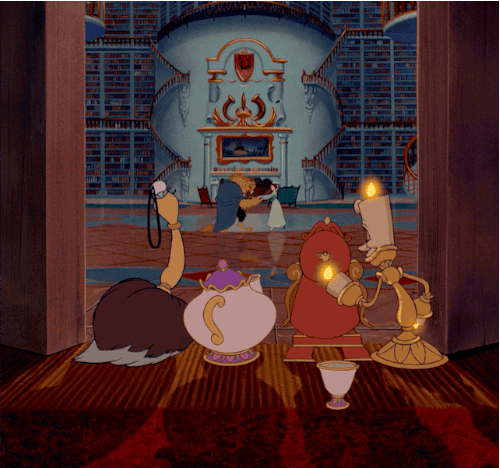
He gives her the library because he expresses interest in doing something to make her happy, and he vocalizes he's falling in love with her. He's delighted by her reaction. During the ballroom scene, the way he looks at her, you can see he absolutely adores her. He asks, "Are you happy here with me?" because he loves her, and her well-being is the most important thing.
In the remake, the staff tell Belle not to got to the west wing because it's a storage area. She wanders over there anyway, for whatever fucking reason, and takes a glance at the rose behind the glass. The Beast finds her looking at it and gets mad at her, even though he never told her not to visit him in the west wing, and she didn't fuck around with the rose. When she runs away, he doesn't even look like he cares. There is no reason for him to go after her, and there is no reason for her to help him back to the castle other than the plot told them to do it. She doesn't help him with his wounds, and the staff are the ones to thank her for returning him. She even asks the staff why the fuck they care about him, because he's such an asshole. They justify his behavior because he had a cruel father, and damn themselves to his fate because they didn't stop a literal monarch from raising his son. Belle continues to take care of him because she pities him? He repays her kindness by insulting her taste in literature.
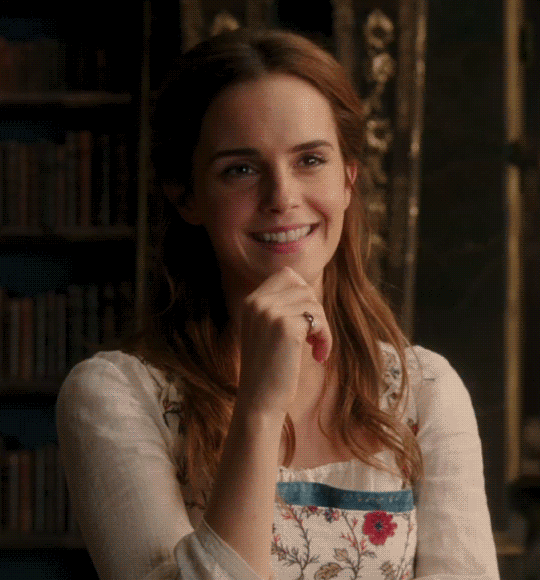
He doesn't even show her the library because he knows she likes books, he does it because he wants her to read "better" books. Then he makes one joke about not reading Greek and THAT IS WHAT MAKES BELLE SWOON. THE FUCKING GREEK BOOK JOKE. I mean, I sort of get it, I fell in love with my ex because he made a bread pun, but he hadn't been continually abusive to me up until that point. Belle starts to read out loud to him, and that's supposed to be the event that incentives the Beast to be better? Even while Belle is singing about how much he's changed (he hasn't), he throws a boulder of snow in her face. The cherry on top of this sundae is his stoic question after they dance, "It's foolish, I suppose, for a creature like me to hope that one day he might earn your affection?" which not only sounds like complement fishing, it is primarily motivated by breaking the curse! Only after she gives an indifferent answer does he ask if she'd be happy at the castle.
Oh god, and the death scene is cut off in the middle because we have to watch 2 minutes of the staff members permanently turning into furniture, which, like, I wouldn't think they'd want to castrate the emotional climax of the movie, but this whole thing is an exercise on how to fuck something already good up.
This movie fails so spectacularly at this basic love story, I can't begin to justify its existence. I wouldn't recommend this to anybody. If you want to watch new Alan Menkin content, watch Galavant, because this movie just pissed me off.
It was bold of Disney to end it with a beastiality joke, though.
4 notes
·
View notes
Text
Smokey brand Select: Biohazrd
With the advent of Peninsula’s release, the sequel of Train to Busan, i wanted to take some time and spotlight a few of my favorites Zombie films. My love for Zombie flicks stems more from the circumstances around the outbreak, rather than the monster effects and whatnot, themselves. Don’t get me wrong, the make-up in these things are almost always spectacular, but, for me, the existentialism is where the true horror of these films truly lie. I like the exploration of humanity and lack thereof in such dire situations. That whole man/monster motif. I am a sucker for those tropes and the study of human nature. For me, those make the best kinds films, that mirror to ourselves, and you get a ton of that in zombie flicks. Now, admittedly, i have seen a ton of these things and it was hard to whittle it down to just ten selections so this is another one of those wonky lists. Look, man, i like movies and this is my list so I'll do what i want!
10b. Overlord

Overlord is an interesting case. It started out as a spec script, then got made as part of the Cloverfield cinematic universe, but dropped that aspect after Cloverfield Paradox sh*t the bed. I think that was for the best because this movie is f*cking insane. It has nothing to do with Cloverfield and everything to do with Resident Evil and Wolfenstein. Indeed, this is everything a Wolfenstein adaption should be. Nazis and zombies and Nazi zombie super-soldiers - oh my! In all seriousness, this movie is one of the most violent, excessive, gory, cinematic pleasures i have ever experienced. Overlord knows exactly what it is and executes that vision with such fervent, bloody, sloppy, enthusiasm, you can’t help but have a great time.
10a. The Crazies

I saw the original version of this film when i was a kid on television. I thought it was an interesting take on the zombie formula and kept it’s existence in my back pocket. The Crazies was the first time i understood that a zombie didn’t need to be undead. This film predated my experiences with first Resident Evil game so infection was a brand new trope for me. Fast forward several years, and the remake drops. It’s so much better that the original. It is a low budget film, which means they need to focus on character and atmosphere to drive the tension home, both of which are absolutely excellent. The Crazies is harrowing, stressful, and brilliant. Both versions are good but the 2010 remake, in my humble opinion, is superior in every way.
9. The Night Eats the World

I stumbled upon this by accident while perusing amazon. I remember hearing about it and thought the premise was interesting. Imagine being locked in one of those dope ass, old timey, Paris apartments during a zombie apocalypse? That hook, alone, got me to bite but the performance given by Anders Danielsen Lie as the lead, Sam, was heart-wrenching. This is a very somber take on the isolation aspect of the zombie genre. This is I Am Legend but with a sobering reality infused in every scene. It was horrifying watching Sam’s mental degradation but a powerful watch overall.
8. Life After Beth

Life after Beth is probably the only light-hearted zombie film of this list and for good reason; It’s outstanding. I debated whether to put Zombieland or Burying the Ex on this list, both excellent in their own right, but i had way more fun watching this one, than either of those. That’s high praise because the first Zombieland is one of my absolute favorite films. Life After Beth is a unique take on the whole genre and Aubrey Plaza as the titular Beth was excellent. I would say it’s about as good as Zombieland, maybe a little better. Mostly because of Plaza. I really like Aubrey Plaza.
7. Deadgirl

This is actually Deadgirl’s second time making a Select list. I figured there would eventually be crossover as some flicks encapsulate so many different genres but it’s surprising that it would be this one. Actually, i think the first was Doctor Sleep with the Stephen King and Vampire lists, but Deadgirl is worth a double-dip, too. It’s super low budget and focuses on a rather interesting take on the Zombie genre. I don’t want to get into it too much because the film, itself, is worth a watch. So go do that. Go watch Deadgirl. Right now.
6. Maggie

This was a legitimate surprise for me to see. Maggie takes place several years after the actual outbreak. Zombies are a thing. They’ve been a thing. Humanity has already crossed that bridge and the virus is just the way of life. they’re the new normal and mankind is busy as much as usual after literally the dead rising from their graves. Precautions are taken to mitigate infection but they still occur with alarming frequency. Maggie is about a father who has to come to terms with his daughter’s infection. You slowly watch this man’s despair and desperation as the inevitable eventually befalls his one and only daughter. It’s stark, and bleak, and f*cking devastating. There isn’t a happy ending to this, it just ends. I loved this movie, man, and a lot of it has to do with Arnold Schwarzenegger’s performance. That sh*t was amazing and easily the best role I've ever seen in. I’m a huge Terminator fan but this performance as f*cking enthralling. Abigail Breslin is awful in it, though.
5. Cargo

Before i get into it’s merits as a zombie flick, i just need to say, Cargo is an excellent film in itself. Strong ass performances. A gripping and emotional narrative. Gorgeous cinematography. Deft direction. It’s an objectively beautiful film. Now, as a zombie outing, this motherf*cker is full of the despair. The whole f*cking thing is an exercise in constant, aggressive, tragedy. Don’t misunderstand, it’s excellent, but it will leave you exhausted by the end. It wraps up nicely and with a subtle tone of hope, but you will be emotionally exhausted, for sure, by the time those credit’s roll.
4. The Girl with All the Gifts

I love this movie if only because they took the cordycep route in regards to infection. The zombie story i wrote way back when i was in high school for my creative writing course, used that as the catalyst for my zombie shenanigans. I always found that sh*t interesting, like, what would happen if that parasitic relationship jumped species. Then The Last of Us came out and i was disillusioned because the story they told, turned out to be so much better than mine. I felt that same emotion when i first saw this movie. The Girl with All the Gifts is brilliant. It’s stunningly human while being objectively horrifying. The zombies play a part, sure, but it’s the inevitable extinction of humanity that drives this film, that haunts most of these characters. It’s X-Men but with zombies instead of mutants and executed in a way that feels disturbingly real. Plus, and i cannot stress this enough, Sennia Nanua is f*cking outstanding as Melanie. To be so young and to give such an emotional performance was a true joy to witness.
3. Night of the Living Dead

The classic that kicked off an entire genre and still, even after fifty-two years, one of the best examples of it to ever be made. Night was terrifying back in the day, mostly because of different sensibilities, but the horror of that film lied with the people trapped in the house. The true monsters were never the zombies, but humanity, itself. It was watching those survivors slowly turn on one another. It was the realization that people will eat each other when pressed with such harrowing events. I used to think that wasn’t true but then Covid happened and people were trampling each other for toilet paper. That was insane. People would absolutely act this way in real life so that ending, as f*cking abrupt and terrible as it was, rang true. That sh*t is what real horror is all about.
2. The Wailing

The Wailing is the first of two South Korean zombie flicks to make this list. Indeed, the other is so excellent, it had to share the top spot but this one, for me, was an easy pick at two. I’ve seen I’ve given The Wailing multiple viewings and every time, without fail, i am pulled into that world. It’s a very methodical film, not in the sense of pacing, but more in the sense of plotting. This thing has a story to tell and you have to commit to it being told. It is a lot to ask but, like so many other films that ask this of you, the experience is incredibly rewarding. Don’t let the fact this thing is Korean language stop you from taking in a true masterpiece. It’s gorgeous, performed adeptly, and shot wonderfully. The environment and atmosphere, alone, are worth the price of admission.
1b. Train to Busan

If 1a didn’t exist, Train to Busan would be the greatest zombie flick i have ever seen. It hits that sweet spot between the human and horror elements perfectly. Setting it on a train makes for some of the most tension filled scenes ever captured of film. For those of you that prefer a more action packed, zombie outing, Busan delivers that in spades, while giving you very real, very emotional, performances to boot. You feel for these characters and the bleakness of their plight. You feel the desperation as the world collapses around them. This movie, zombie elements remove, would still be f*cking fantastic. Add the horrors of an undead apocalypse, and you have one of the most devastating accusations of humanity ever captured on film.
1a. 28 Days Later

This is the greatest zombie film i have ever seen, hands down. It does everything Train to Busan does, AND sticks that feeling of isolation so well. In a lot of ways, this is more a study on the horrors humanity can commit in the face of oblivion, and i dig that. There are shades of that aspect permeating throughout all of these films but the first third of 28 Days Later nails that bleak loneliness with such aggressiveness, it’s borderline sadistic. This was my first experience with Cillian Murphy and i was thoroughly impressed. Dude was incredible in this role so imagine my complete lack of surprise when he popped up in Batman Begins. It’s said he got Scarecrow because of Days and i can totally see that. Watching this man’s career blossom has been a real pleasure but, for me, his Jim will always be the role i think off when people say his name. If you’ve never seen 28 Days Later, rectify that at once. It’s an incredible, gorgeous film that is definitely worth a watch.
Honorable Mentions: Burying the Ex, Zombieland, Shaun of the Dead, Dead Snow, Return of the Living Dead, Re-Animator, Day of the Dead, World War Z, Contracted, REC, Pride and Prejudice and Zombies, Gallowalkers, Pet Sematary, Resident Evil
1 note
·
View note
Text
Frankly In Love by David Yoon

*Photo courtesy of penguinteen.com*
Title/Author/Publisher/Year Published: Frankly In Love by David Yoon | Published by Putnam Young Readers in September 2019
Plot Summary: Frank Li wants nothing more than to be in love. But it’s not that easy. Love never is, but especially not for Frank who has seen first hand what happens when his parents don’t approve. So Frank lives in the hypothetical: is it better to date someone who is Korean to appease his parents (but then they will always be involved) or date someone else that they might not approve of (and become ostracized)? But when Brit Means looks at him a little differently, it’s no longer a hypothetical because Frank Li is falling and falling fast. The only problem? Brit is white. Lucky for Frank a fellow Limbo (Limbo referring to the Korean-American children of his family’s friends who came over from Korea together) is in the same predicament. Joy and Frank come up with a scheme to date who they want with their parents none the wiser. They will fake date each other. It seemed like the perfect solution until Frank begins to suspect he might not be entirely faking it.
Ugh, okay, so I have a lot of thoughts and feelings about this book so please just bear with me. Honestly, I hate saying it but I had such a tough time getting through this book. I think the main issue, as always, was my expectations. The way I’d heard people talk about it I was anticipating a cute, fun YA romance with my favorite trope, fake-dating-turned-real, and I guess in a way that is what it was? But I was vastly unprepared for Frank. Or the fact that this book is stuffed to the gills with tropes.
Frank is weird, by the end I would say that I loved him, but I was initially caught off-guard by the way he talks and thinks and I found it made it harder to get into his character and thus the story. Additionally, his relationship with Brit feels like it comes out of nowhere and suddenly they’re in a fairly serious relationship? And *SPOILER* he ends up cheating on her with Joy. Normally, I don’t like to include spoilers or I hide them, but I feel like this is an important issue I had with this novel. I almost stopped reading because Frank is supposed to be the good guy and in that moment (and the following pages when he tells Brit) he was a fucking jackass. The only thing that slightly redeems him is that he immediately recognized it as cheating and didn’t waste time telling Brit or lying to her about it, but it still sucked.
However, that all being said, the book holds some important discussions about what it means to be Korean-American, Asian-American, or really just anything with that dreaded hyphen. There’s talk about whiteness and how the privilege of belonging to the majority tends to erase those immigrant stories and identities. There are discussions of blackness not only because of Frank’s sister but because of Frank’s best friend. Race is interwoven into every aspect of this novel and David Yoon does it with grace and care and without fear.
Anyway, if you’ve read this and have thoughts feel free to respond! I’d like to see what other people who’ve read it thought about it in all of its chaotic glory.
Warning: Keep reading at your own risk because I have included a spoilers section for a few important details I wish I had known going into this book because they could be potentially triggering (nothing is graphic which is probably why it wasn’t heavily mentioned in discussions about this title). And as always my favorite quotes because damn does David Yoon have a way with words.
Spoilers:
Frank’s dad gets shot while working at The Store and almost dies, but survives only to find out that he has cancer and less than a year to live which sparks a fight with his longtime friends which means that right when Joy and Frank get their shit together they don’t feel like their parents will approve because there’s a rift so like fuck a happy ending I guess?
Quotes:
She was brave—braver than me—but now I wonder if being brave is worth it. The brave go first into battle. But that makes them the first to go down, too.
In Language class Ms. Chit would called this code switching. It’s like switching accents, but at a more micro level. The idea is that you don’t speak the same way with your friends (California English Casual) that you do with a teacher (California English Formal), or a girl (California English Singsong), or your immigrant parents (California English Exasperated). You change how you talk to best adapt to whoever you’re talking to. But it’s not just about adaptation, as Ms. Chit explained. People can code switch to confuse others, express dominance or submission, or disguise themselves.
I feel my stomach wave hello. My ears grow warm. Gravity eases enough to loosen all the joints and nails and screws holding the world together until all its pieces are slowly tumbling free in a soft huge space lit only by the white rectangle beneath my thumbs. My girlfriend is texting me.
There’s an anger in my heart the color of dark red ready to paint the walls with curse words, but there’s no point in getting into all that.
Let me tell you something. I live to make people laugh. Parents, siblings, friends, lovers, doesn’t matter. I just have to. If you for some reason don’t know how to make someone laugh, then learn. Study that shit like it’s the SAT. If you are so unfortunate as to have no one in your life who can make you laugh, drop everything and find someone. Cross the desert if you must. Because laughter isn’t just about the funny. Laughter is the music of the deep cosmos connecting all human beings that says all the things mere words cannot.
American girl, they okay. When Mom-n-Dad say American, they mean white. When they refer to themselves—or me—they say hanguksaram, or Korean. I never call myself just Korean. I call myself Korean-American, always leading first with Korean or Asian, then the silent hyphen, then ending with American. Never just American. White people can describe themselves with just American. Only when pressed do they go into their ethnic heritage. Doesn’t seem fair that I have to forever explain my origin story with that silent hyphen, whereas white people don’t. It’s complicated. But simple. Simplicated.
But I feel bad for Brit, whose immigrant stories have most likely been washed away like surf erasing sandwriting. She may call herself European-American, but to most of the world she’s just white. As a member of the majority, she belongs everywhere. As the product of a long, mixed-up heritage, she belongs nowhere.
Saying it makes it feel more true. I get the feeling that the more I say it, the truer it will feel over time. And eventually this truth I’ve created will weave itself into every fiber of my reality, until it moves naturally with my every gesture like a favorite shirt I can’t help but wear always.
It’s like my heart has turned to lead and is now too heavy to carry alone, so Joy is helping me.
At first, I can’t tell why this is so hard for me. But really I’m lying to myself. I know exactly why it’s hard for me. Because down this conversational road is the acknowledgment of a fundamental difference between me and Brit—a fundamental difference of being—and I can’t bear to admit that such a difference exists. Brit—wise, awakened, aware Brit—belongs to a white majority whether she wants to or not, and is entitled to all its privileges—also whether she wants them or not.
I look at Brit a little differently now. Like there are more rooms than I realized in the house of her heart, and not necessarily neat-and-tidy ones.
She is scared to death saying this. I can see it in her eyes. I can smell it on her skin. Because love is more terrifying than anything. Love is a mighty blue hand coming straight for you out of the sky. All you can do is surrender yourself and pray you don’t fall to your death.
#frankly in love#david yoon#young adult#ya#romance#fake dating#books#book blog#booklr#book quotes#quotes#race#korean#korean american#YA tropes
3 notes
·
View notes
Photo

All the Cinephiles!
Talking films with filmmakers at TIFF 2019, including Bong Joon-ho, Beanie Feldstein and Daniel Radcliffe.
The 2019 Toronto International Film Festival brought pay-offs for the Letterboxd community from some heavily anticipated world premieres: Taika Waititi’s “anti-hate satire” Jojo Rabbit, Rian Johnson’s entertaining whodunnit, Knives Out, Marielle Heller’s A Beautiful Day in the Neighborhood, Todd Phillips’ Joker, and the Canadian premieres of big-hitters like Palme d’Or winner Parasite, The Lighthouse, Bacurau and Marriage Story.
The following films also went over well with the Letterboxd members in attendance: Blood Quantum, Saint Maud, Color Out of Space, La belle époque, Waves, 37 Seconds, The Burnt Orange Heresy, About Endlessness, The Invisible Life of Eurídice Gusmão, Uncut Gems, The Obituary of Tunde Johnson, Dolemite Is My Name, Just Mercy and documentaries The Australian Dream and Collective.
We took the chance to ask some of the many filmmakers on the ground in Toronto about films they love (and the films they were there to represent).
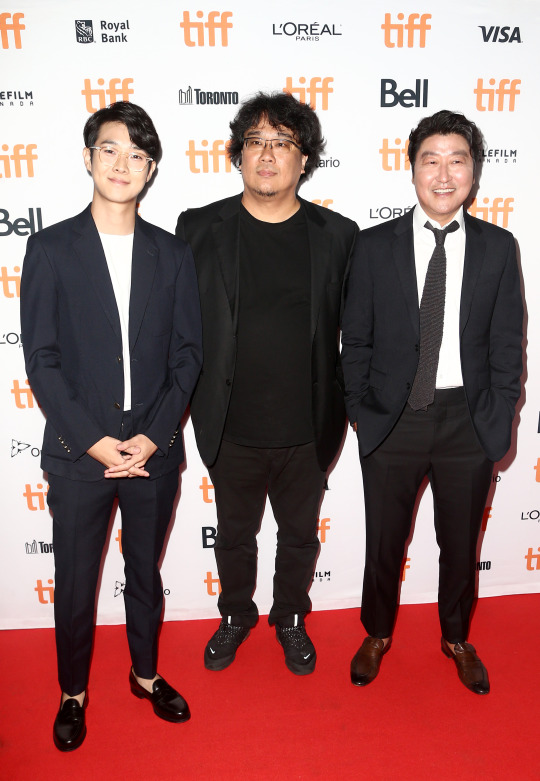
Choi Woo-shik, Bong Joon-ho and Song Kang-ho at the Toronto premiere of ‘Parasite’. / Photo courtesy of TIFF/Tommaso Boddi.
Parasite
“All the cinephiles, the film geeks!”
We had just one question for Bong Joon-ho: how does he feel about Parasite being not just our highest rated film this year, but this decade? “I’m so happy with that. All the cinephiles, the film geeks! Me, also the cinephile, so I’m very happy with that news, thank you!”
Choi Woo-shik, who plays Ki Woo, the son in Parasite’s poorer family, described what it’s like to be directed by the acclaimed filmmaker. “This is my second time working with director Bong. He gives very friendly but subtle, very descriptive direction to actors, so I think that gave us a lot of confidence to act better.”
His favorite scene to film? “It must be the scene where the whole family’s drinking together in our semi-basement, right before my friend comes from work and gives me the stone. It was really fun working with director Bong and Song Kang-ho as my father. It was perfect.”
‘Parasite’ opens in US cinemas on October 11.

Producers Debra Hayward and Alison Owen, actors Beanie Feldstein, Alfie Allen, writer Caitlin Moran and director Coky Giedroyc. / Photo courtesy of TIFF/Phil Faraone.
How to Build a Girl
“That’s someone who’s really enjoying writing.”
Beanie Feldstein, admired for her work in Booksmart and Lady Bird, hit the TIFF red carpet for famed feminist writer Caitlin Moran’s adaptation of her semi-autobiographical novel, How to Build a Girl. Feldstein is a riot as Wolverhampton teen Johanna Morrigan, who reinvents herself as “Dolly Wilde”, a rock critic and “lady-sex-pirate”. Feldstein promised Letterboxd that if Moran’s next two books about Morrigan, which have been optioned by the same producing team, are also adapted for the screen, she’s in for the trilogy. “Of course! I mean, she’s my girl! I feel so protective of Johanna and I love her so much.”
We asked the reigning queen of the coming-of-age genre about the films that she loved, growing up: “I grew up obsessed with Funny Girl. Fanny Brice is my idol! Bridesmaids, my senior year of high school, was, like, the best movie ever. It was the most memorable theater-going experience of my life.”
How to Build a Girl is Caitlin Moran’s first film screenplay. (Working with her sister, she has previously adapted their family life for the British sitcom Raised by Wolves.) We asked Moran which screenwriters she most admires. “Oh my gosh. Who do I really love? If you read the scripts of Bruce Robinson, who did Withnail and I and How to Get Ahead in Advertising, those scripts read beautifully. All the description is there; he describes the sky looking the color of burnt sugar. That’s someone who’s really enjoying writing and you feel that vivacity come through on the page and in the character of Withnail. I love Bruce Robinson’s scripts.
“Juno was my favorite film of the last ten years. The way that that story was told just made me incredibly happy. I just love Diablo Cody so much. Like, when you read her stuff you feel her heart, sometimes her groin, and her massively exploding soul! So that’s what I’m always looking for. I just want to see things on screen that look real, that someone went ‘I’m going to have to write this or bust’. I hate films that look like someone went, ‘Oh, we’d better make a film that looks like a film’. I want people to have sat down and done a list of things where they’re, like, ‘What would I like to see on screen that I’ve never seen before?’
“And that’s what we tried to do with How to Build a Girl. I just literally, when I was writing the book, just [had] a list of things that I’d never heard anybody talk about with girls.”
‘How to Build a Girl’ does not yet have a scheduled release date.

Willem Dafoe, Robert Eggers and Robert Pattinson. / Photo courtesy of TIFF/Tasos Katopodis.
The Lighthouse
“I think the fart jokes work.”
The Lighthouse, directed by Robert Eggers and co-written with his brother, Max, is a film that the word “bonkers” has been thrown around a lot to describe. Willem Dafoe and Robert Pattinson go head-to-head in the black-and-white, claustrophobic, psychedelic and disarmingly funny psychological horror.
Max told us: “I came up with the original conceit that, you know, the sort of horror-genre of a lighthouse, I’d never seen done. And then Rob needed a writing partner. Well, actually, he had said to me, ‘Do you mind if I steal this lighthouse idea?’ And I was like, ‘Sure, fine, whatever,’ not knowing where it would land me eventually!”
Writing as brothers, says Max, involved “a lot of turpentine being drank! That’ll make sense for people who see it later. No, I’m just joking. It was a perfect fit. We trust each other, and I think that’s the big thing about writing teams is you gotta trust each other. And brothers, you know, it’s easy. You’d hope it would be easy. Sometimes it’s not.”
When we suggested that the brotherly relationship likely influenced a lot of the flatulence comedy in The Lighthouse, Max agreed: “Yeah, again, it’s one of those things where we took risks. Comedy is about that. You’ve gotta be able to be honest and trust yourselves. We didn’t know how it was going to play but, thankfully, I think the fart jokes work.” (When asked at the TIFF Q&A whether those farts were real, Dafoe replied: “Half and half.”)
Robert, when asked about the film he remembers as inspiring him to think about filmmaking, immediately offered Star Wars, particularly because of the available behind-the-scenes coverage that aided the “discovery process”. Max couldn’t recall the first film that inspired him into a movie-making career, but “one that reaffirmed my work would be a film by Elem Klemov called Come and See, which is the greatest, one of the best films I’ve ever seen. Amazing film.”
‘The Lighthouse’ opens in US cinemas on October 18.
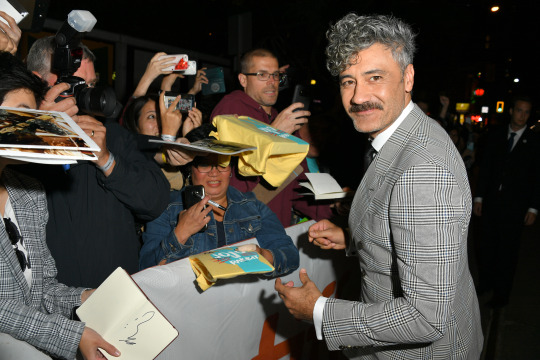
Taika Waititi at the TIFF premiere of ‘Jojo Rabbit’. / Photo courtesy of TIFF/George Pimentel.
Jojo Rabbit
“Adults are ridiculous.”
“To me, Kak was so visceral and real.” That’s Jojo Rabbit producer Chelsea Winstanley talking about her imaginary childhood friend, for whom her family would set a place at the table and open doors, at her instruction. Jojo Rabbit’s writer-director Taika Waititi is also Winstanley’s husband, so her producing role naturally started early in the process, when they would share stories at home about childhood imaginary friends. Waititi plays the title character’s imaginary confidante: a stupid, vain, petulant and badly-dressed version of Nazi despot Adolf Hitler. It’s a character not found in ‘Caging Skies’, the Christine Leunens novel from which the film was adapted.
“We talked a lot, shared stories like that, so I think it’s very clever that he introduced that,” Winstanley explains. “It’s almost like we want to have some kind of heroes in our lives but we don’t know if they’re good or bad. Jojo doesn’t know the actions of adults. We’re just ridiculous. Adults are ridiculous. So it’s a really incredible way to show this kid that [Hitler is] not such a great hero.”
Winstanley, a director herself, was last at TIFF with the female-directed anthology film Waru, and produced the acclaimed documentary Merata: How Mum Decolonised the Screen, which was picked up by Ava DuVernay’s Array Releasing and is currently available on Netflix. “It’s amazing how I get messages, emails from people around the world who have watched it, because they can, thanks to Ava DuVernay. She championed this film to get out there. I have a massive girl crush on her.”
On the topic of inspiring women, Roman Griffin Davis, who has been gaining notice for his title role, praised his acting coach, New Zealand actor Rachel House: “She’s properly amazing. She’s a great actress and she’s very good at teaching acting. She kind of taught me how to act. Apart from my mother as well!” Fun fact: House is a long-time collaborator of Waititi’s (and voices Gramma Tala in Moana).
At the Jojo Rabbit Q&A, actor Stephen Merchant revealed the inspiration for his Nazi Gestapo officer: “I don’t think it’s going to come as a shock to anyone that I obviously watched Raiders of the Lost Ark. The great Ronald Lacey performance as the Nazi Gestapo officer… he’s very scary and terrifying so that to me seemed like a great guide; you can be comic but every so often you just turn on that chill factor.”
Meanwhile, Jojo Rabbit production designer Ra Vincent told us that the film Life is Beautiful—and the personal interests of filmmaker Sir Peter Jackson—were his key influences for the film’s design. “I’ve had quite a long relationship working with Peter Jackson and being around his interests, which are First World War memorabilia and stories. So I’ve had an opportunity to see how close to people’s hearts these stories are, and how it’s important to protect them.”
As for the films that made him want to be a filmmaker, Vincent, who began his movie career as a model maker, replied: “I think Star Wars did it to me. And also, oddly enough, Medusa [Ray Harryhausen’s work in Clash of the Titans], because of the claymation aspect to it. That’s my background.” Vincent is already working with Waititi on his next project, “a very nice little feel-good film about the American Samoa soccer team of 2011. It’s exciting to do a job at the beach!” (Michael Fassbender is reportedly in talks to play the team’s coach.)
‘Jojo Rabbit’ opens in the US on October 18.
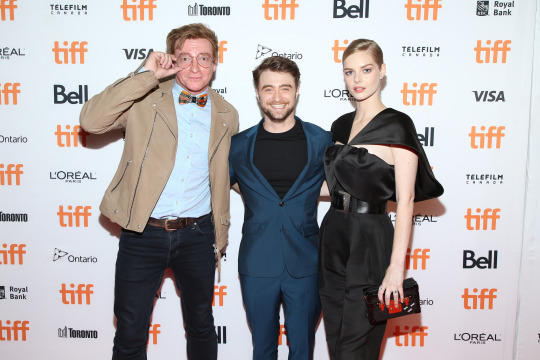
Rhys Darby, Daniel Radcliffe and Samara Weaving. / Photo courtesy of TIFF/Phil Faraone.
Guns Akimbo
“Life’s too short to work with assholes.”
Daniel Radcliffe hit the red carpet this year for New Zealand director Jason Lei Howden’s Guns Akimbo, the follow-up to his micro-budget, metal-horror, splatter-fest Deathgasm. Also starring Samara Weaving and Rhys Darby, Guns Akimbo finds Radcliffe drawn into a live-streamed game in which guns have been bolted to his hands. It’s a far cry from Harry Potter and, looking over his recent output, we couldn’t help but comment that he must be having the time of his life picking roles as far from the boy-wizard as possible.
“I mean, I’m looking to be happy and live a nice life,” Radcliffe replied. “I’m very fortunate to be in a position where I can really pick and choose what I wanna do. No actor is in that position. That’s such a gift, so I’m very lucky to just get to work on stuff that I love and is maybe, I am told, weird, but I love it. And, yeah, also life’s too short to work with assholes, so I generally love to work with lovely people like Samara and Rhys and Jason. It’s very nice.”
Getting Radcliffe to name the film that made him want to work in movies is a tricky ask, since he started out so young. “That’s what’s weird about me is that I feel like most actors get into it by becoming a fan of film and then, like, ‘I wanna be an actor,’ whereas I was on film sets already by the time I realized I liked film. And I love film sets. I love being here. I feel like that’s what I fell in love with, was actually the experience of making things on set.” When pushed, he ponied up: “The first films I remember falling in love with are, like, Toy Story. Those are the first films that I remember seeing and going, ‘Oh, this is amazing’.”
Rhys Darby, who plays a down-and-out character named Glenjamin in Guns Akimbo, had been at the premiere of his friend Taika Waititi’s film the night before (Darby played Psycho Sam in Waititi’s Hunt for the Wilderpeople). “There’s nothing like it,” he said of Jojo Rabbit. “He manages every time to cast these fantastically comic-driven, gifted children, and [to] have so much pathos and heart. It was a triumph. I’m just jealous I wasn’t in it!”
Asked what the film was that made him want to get into the entertainment business, Darby responded: “Wow, that’s a good question. To be honest, I’ve always been a James Bond fan. I grew up watching the Roger Moore James Bonds, and it was the epic-ness of those 1980s films, which are ridiculous. The Roger Moore ones, there’s a lot of humor in them, there’s gadgets, and there’s these great locations, and I kind of dreamed of the idea of maybe being part of that world. It just seemed so ridiculous that it would never happen to a kid from Pakuranga, but it’s kinda happening!”
Darby recently achieved a dream of visiting Bond creator Ian Fleming’s home. “I actually went to Goldeneye! Yeah! Who would have thought that I’d get to go to Ian Fleming’s resort in Jamaica, and sit on his chair, where he wrote these novels? That was really special to me.”
‘Guns Akimbo’ does not yet have a scheduled release date.
#TIFF#tiff 2019#TIFF19#jojo rabbit#guns akimbo#parasite#bong joon-ho#daniel radcliffe#rhys darby#caitlin moran#beanie feldstein#the lighthouse#robert eggers#max eggers#james bond#chelsea winstanley#roman griffin davis#Scarlett Johansson
7 notes
·
View notes
Text
Daredevil Countdown: 8 Days
Trailer #1 Analysis
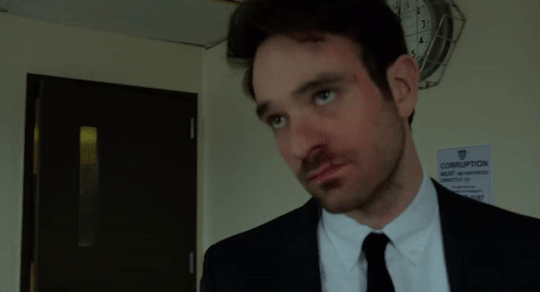
We barely had time to recover from Iron Fist Season 2 before Netflix started dumping Daredevil content on us, and it’s been tough to keep up! We were away minding our own business at NYCC when this trailer dropped, and we’ve only just started to pick through it. There are some major revelations in this thing, which I’m very excited about. There are also a few scenes excerpted here that we saw in their entirety at NYCC, so while I’ll try to keep spoilers to a minimum, expect some minor ones.
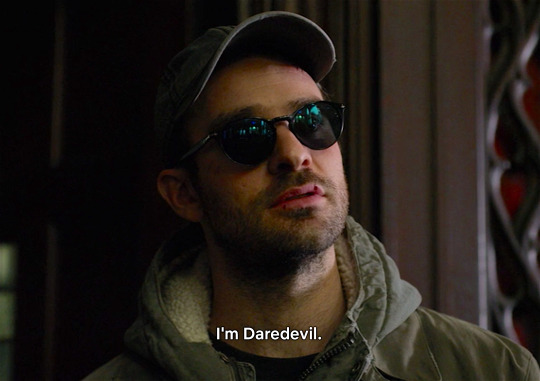
Is it geeky to get a kick out of Matt saying this? Because this makes me really happy. He has spent so much time struggling with his superhero identity that just hearing him call himself Daredevil is thrilling. Also, the background seems to suggest that he’s in the church, and may therefore be saying this to Maggie... which is good, because in one of the scenes we saw at NYCC, she called him “the Devil of Hell’s Kitchen” and I nearly pitched a fit.
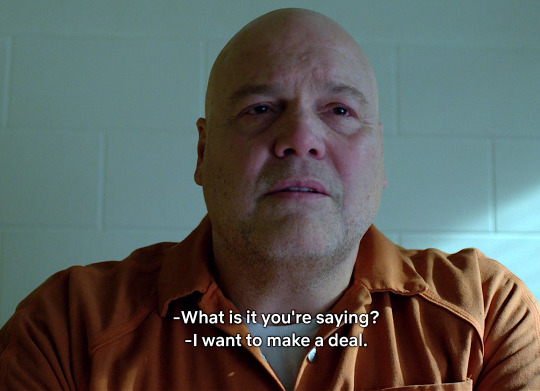
We saw this scene, so I won’t go into details... beyond saying that it kicks off what sounds like will be an interesting (read: upsetting) relationship between Fisk and the FBI, and as well as Fisk’s manipulation of the justice system and the city as a whole this season. He is getting out of prison and aiming to reclaim his throne, and this trailer gives us hints of some of the pawns he will be using to make that happen.
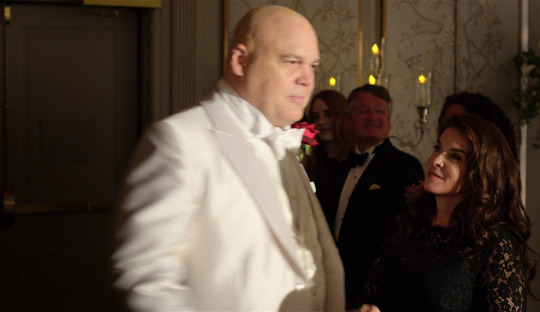
Hey look, it’s Rosalie Carbone!
And we’ve mentioned it before, because it’s been in a bunch of the promos, but it’s great to finally have Fisk in his comics-accurate white suit! He looks great.
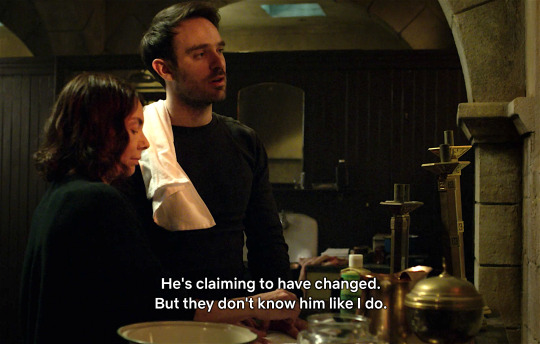
We’re also finally getting Sister Maggie! In the comics, of course, Maggie is Matt’s long-lost mother. In the show, we know that she works at the orphanage where Matt ended up after Jack’s death, and that she will be providing him some degree of emotional support (not to mention medical help...) following his near-death experience under Midland Circle. Their relationship is very strange, and in the comics they’ve spent a long time trying to negotiate their dynamic. They go back and forth on their degree of emotional closeness (depending on the writer), and while they will likely never have a parent/child relationship in the traditional sense, they do hold deep significance in each other’s lives. Whether that will become true in the show remains to be seen, but at the very least, Maggie will clearly act as a confidante for Matt during this difficult time.
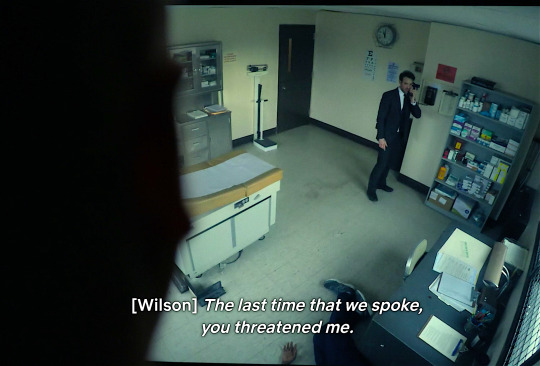
This is one of several highly intriguing interactions between Matt and Fisk in this trailer. The surveillance is particularly interesting. It ties into the suggestion later in the trailer that Fisk will develop some control over media surveillance (in the comics he buys his own radio station during Chichester’s run). It also gives me a small amount of hope that we might get expert media manipulator Jonathan Powers (AKA the Jester) in the show, because that would be really cool. But why is Matt in a doctor’s office in a suit? The framing of this scene is great, and I really need to know what’s going on here.
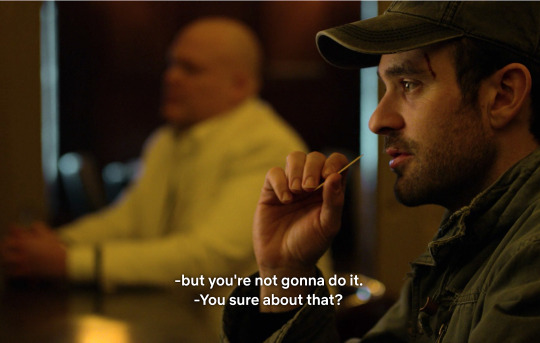
Matt channeling that Stick vibe is something I never knew I needed. And this is another intriguing interaction between these two. What is the context here? For now, I love how cocky Matt sounds in this clip. Clearly, his spirit has not been broken (yet?) by this point.
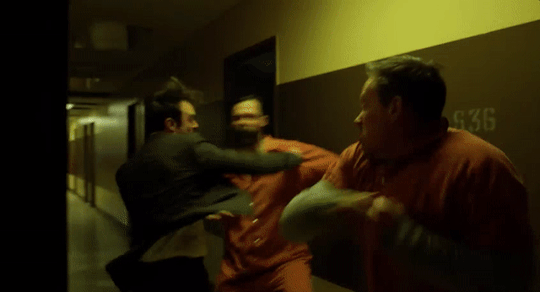
At NYCC, there was some mention of a scene that would rival the hallway scene from Season 1. This may be it. I’m already pumped about this, because I love when Matt fights in civvies! If I were to guess what was going on here, I’d assume these are prisoners in Fisk’s pocket who have been instructed to take Matt out. This has serious “Devil in Cell Block D” (a story arc in which Matt is sent to prison) vibes, and that is very exciting. Whether or not the actual story draws from that arc, just a reference to the tone or basic concept would be awesome.
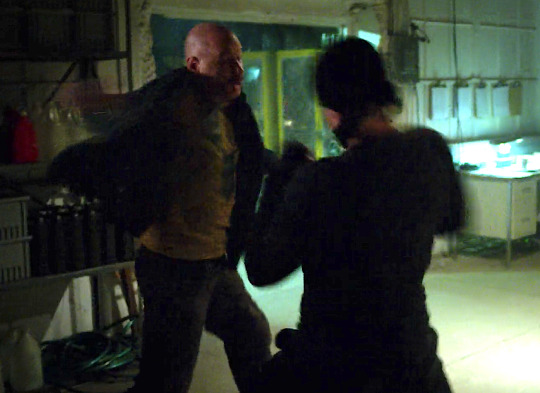
After two full seasons of teasing, we’re finally getting a Gladiator origin! Back in our Season 2 countdown, I wrote a post detailing Melvin Potter’s story in the comics, hoping that it would be adapted soon. The show has already laid down several key elements of his character: his vulnerability (particularly in regards to being manipulated by the people around him) and the tug-of-war between his gentle nature and his capacity for violence. In the comics, many of Melvin’s most compelling stories cover this struggle, as Matt and Betsy Beatty (Melvin’s social worker-turned-girlfriend) attempt to help him suppress the dangerous, out-of-control side of himself. As we see later in the trailer, Fisk is going to start using Melvin for his own ends again this season, thus pushing him to protect himself and Betsy by becoming the Gladiator.
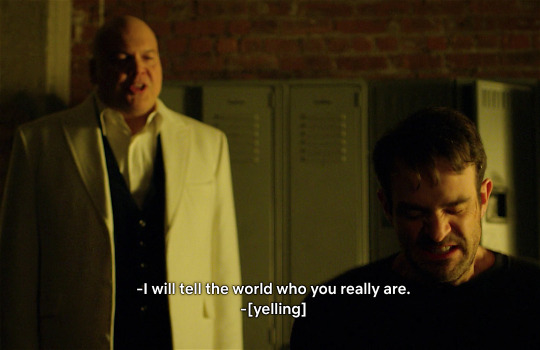
Yet another oddly candid moment between Matt and Fisk. This is so uncanny that I almost wonder if it’s a hallucination. It’s also worth noting Matt’s lack of sunglasses in these scenes. In both the comics and the show, the glasses serve Matt as a type of mask, and his scenes are given an added layer of intimacy and exposure when he takes them off. Regardless of context, it’s clear that Fisk will be seeing Matt this season at his most vulnerable, with all facades and pretext removed. Which brings us to that quote...
Get excited, because it looks like we’re finally getting some big deal Daredevil Secret Identity Shenanigans(TM)! Matt having his secret identity exposed is a longtime Daredevil tradition; such a pervasive plot point that even Matt has begun joking about it.
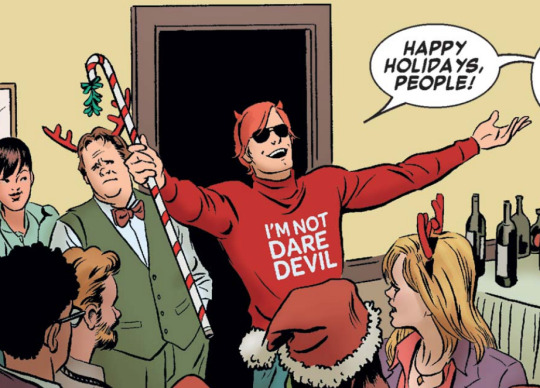
Daredevil vol. 3 #7 by Mark Waid, Paolo Rivera, and Javier Rodriguez
Going all the way back to the Mike Murdock Saga in the 60s, Matt has struggled with keeping his double life hidden-- a surprisingly challenging task for a blind guy without outwardly obvious superpowers. Ben Urich figured it out through research and deduction, and while he has remained loyal in keeping Matt’s secret, a fellow reporter once nearly stole his notes and made them public. In “Born Again”, the Kingpin found out and used the information to ruin his life. Later, one of the Kingpin’s underlings sold the information to the FBI, which then made its way into the newspapers. Recently, with his secrets being used as blackmail, Matt decided to make his identity public. He has gone to extreme lengths over the years-- faking his death, lying under oath, creating various alternate personalities-- to protect his dual identity, and the thought of seeing him finally faced with this same challenge in the show is very exciting.

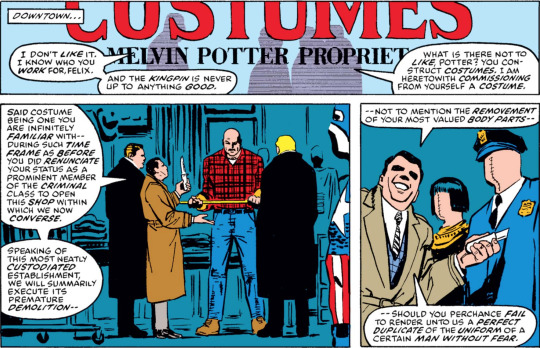
Melvin: “I don’t like it. I know who you work for, Felix. And the Kingpin is never up to anything good.”
Felix: “What is there not to like, Potter? You construct costumes. I am heretowith commissioning from yourself a costume. Said costume being one you are infinitely familiar with-- during such time frame as before you did renunciate your status as a prominent member of the criminal class to open this shop within which we now converse. Speaking of this most neatly custodiated establishment, we will summarily execute its premature demolition-- not to mention the removement [sic] of your most valued body parts-- should you perchance fail to render unto us a perfect duplicate of the uniform of a certain Man Without Fear.”
Daredevil vol. 1 #230 by Frank Miller, David Mazzucchelli, and Christie Scheele
As we know, that’s going to be Bullseye’s costume. This is a combination of two plot points: one from “Born Again” (above) in which Fisk commissions a DD suit from Melvin to give to a convicted murderer, who he sends to kill Foggy, and one from Nocenti’s run in which Bullseye himself runs around causing chaos as Daredevil.
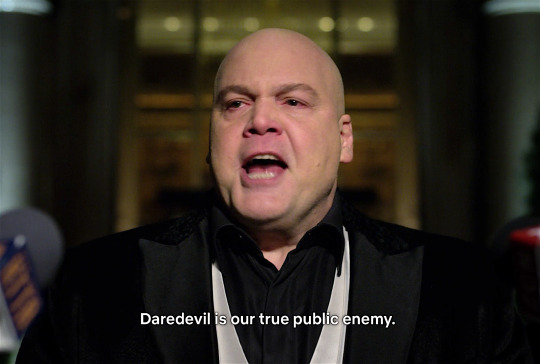
As indicated above (and just like he attempted in Season 1), Fisk is out to ruin Daredevil (and maaaaybe also Matt Murdock?)’s reputation, even more than Matt might manage all on his own.
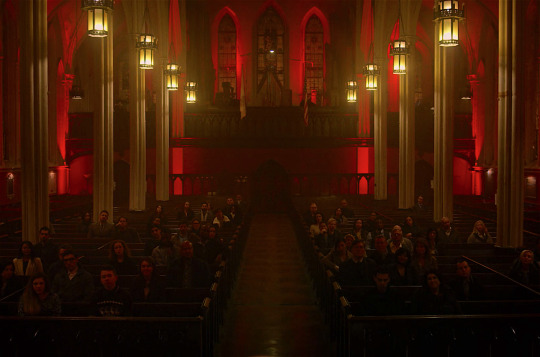
This is a terrifying image, because it brings to mind Karen’s funeral in “Guardian Devil”. But a bunch of the people in the audience are smiling, so hopefully not...
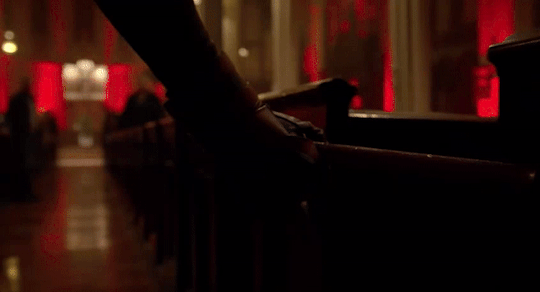
...Unfortunately, they’re still screwed. Bullseye in the church is both a “Guardian Devil” reference and (even better) a movie reference!
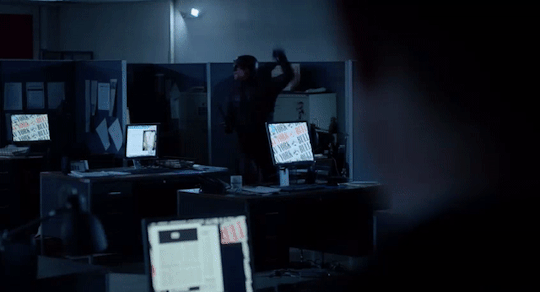
We were shown this scene at NYCC, and it is awesome! I can’t wait for everyone to see it, so that I can talk about what makes it so great. It’s an absolutely killer fight scene that emphasizes just how intense Bullseye is as an opponent when handled well. And I’m not going to spoil this moment in particular... All I’ll say is that it’s something we’ve all been waiting for for two damn seasons, and when it happened at the panel, the whole room screamed.

*Cough* Don’t worry, that’s not Bullseye.
Also, there is not nearly enough Foggy and Karen in this trailer.
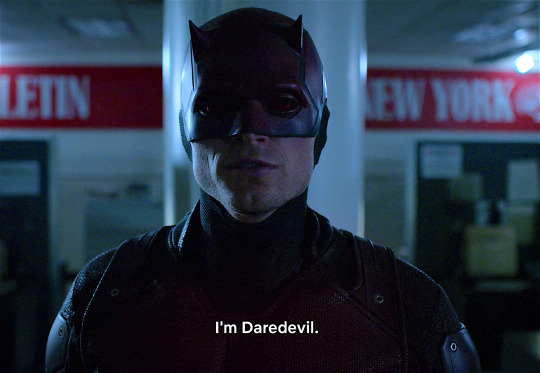
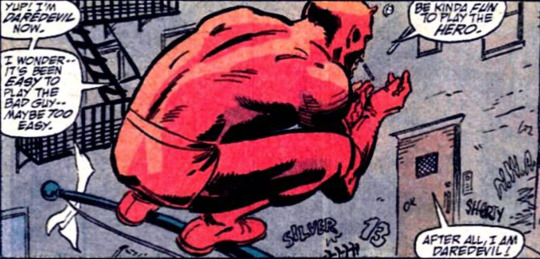
Bullseye: “Yup! I’m Daredevil now. I wonder-- it’s been easy to play the bad guy-- maybe too easy. Be kinda fun to play the hero. After all, I am Daredevil!”
Daredevil vol. 1 #290 by Ann Nocenti, Kieron Dwyer, and Steve Buccellato
As mentioned above, Bullseye will be prompted by Fisk to run around as Daredevil, ruining Matt’s reputation. Both actors have talked a little bit about Fisk’s manipulation of Dex, and the fact that this will play a large part in the latter’s turn to villainy. In the final arc of her run, Ann Nocenti penned a story in which Bullseye and Daredevil switched costumes, resulting in an intense exploration of villainy and heroism, and of their bizarre relationship as nemeses. In the show, it should be fun-- and probably a little horrifying too-- to see how this jumbling of identities affects how Matt and Dex see themselves and each other.
T-minus one week!
#Daredevil spoilers#Netflix Daredevil#Daredevil#Commentary#DD Countdown#Sorry this is so late! Busy day.
86 notes
·
View notes